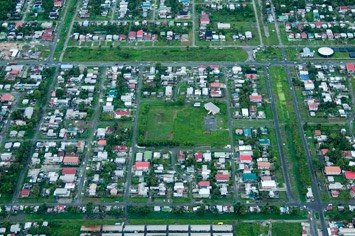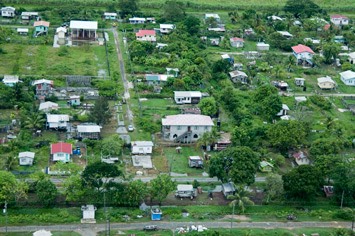Saturday, 30/06/2012: Georgetown – Iwokrama
When the time came to set off for the airport it was still too early for the hotel to be serving breakfast. So, after yet more sandwiches and a bit of fruit, we went to find Dennis, who was waiting to drive us to the airport. We wondered what excuse Dennis would have this time for all our excess luggage, as he could hardly say we were going to study the turtles in the middle of the rainforest but we went to a different check-in desk and no further explanations were needed: we just had to hand over some cash. It then turned out that there was heavy rain at our destination of Annai, so we ended up waiting at the airport for around two hours. When we were finally allowed to board, we found that our favourite seat behind the pilot was already taken by a lady, whose husband actually sat in the co-pilot’s seat. We nevertheless had some splendid views of the endless expanses of the rainforest, its endless expanses interrupted only by the pock-marks of the occasional gold mine. We also flew low over several wooden buildings, and it turned out that this was the Iwokrama River Lodge and research station. Unfortunately, we didn’t figure that out fast enough for a photo… After flying around several hills, the rainforest suddenly stopped and gave way to the savannah of the Rupununi.
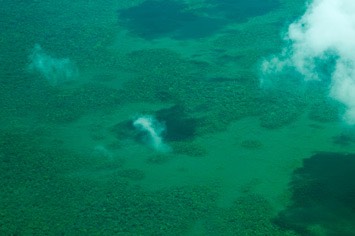
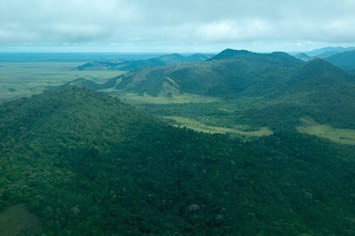
We landed at Rock View Lodge (http://rockviewlodge.com) near Annai, where we were welcomed and immediately taken to a room. This caused a bit of confusion, as we didn’t expect to spend the night but carry on directly to Iwokrama. We were then told to have a look around the lodge, while the son of the owner would try to contact Wilderness Explorers and Iwokrama to find out how we should get to Iwokrama. Apparently, this was all done via online chat, and by the time lunch came around, we still didn’t have an answer. Lunch was served in a lovely open building, and we could help ourselves from a buffet. However, because we were not on the official guest list, we were seated at a separate table, while the couple we had met on the plane and an Indian family with two very unhappy looking teenage daughters all shared one big table. After the meal, when the Indian family had left, we joined the Mike and his wife and had a chat with them. It transpired that Mike was actually the CEO of Transguyana Airways we had flown with! That explained he had been sitting in the co-pilot’s seat! We also had a look at the famous Dakota Bar, which got its reputation from the days gone by when supplies were flown out to Annai by Dakota aircraft. We were then also told that Rock View Lodge was responsible for our transport to Iwokrama, but that information had apparently got lost and their only capable car was somewhere in Brazil, where some other family members attended a conference. Therefore, a car would need to be found to transport us to Iwokrama, which would take yet more time.
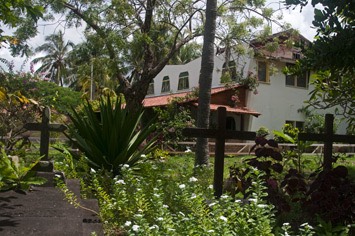
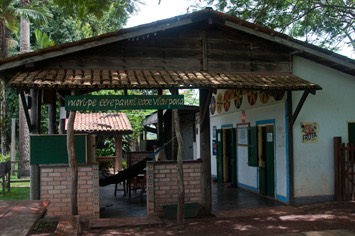
By the time a Toyota Hilux turned up it was already two o’clock, and we faced at least three hours of driving to get to Iwokrama River Lodge. We would be lucky to get there before dark. Our driver was an Amerindian guy called Lake, who squeezed us and part of our baggage into the double cab. That meant that his companion, together with his trusted dog Ted, would have to ride on the open back, a fact that Ted didn’t seem to be too happy about, especially when it started drizzling shortly after we set off. The dirt track we drove along went right through the rainforest, which was an amazing experience for us. Every so often we would have to cross a little river or stream, driving over bridges made from thick pieces of timber, which weren’t always quite aligned any longer…
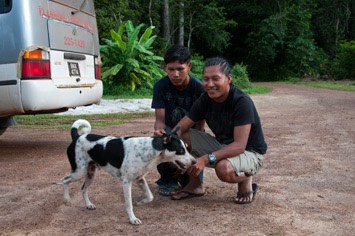
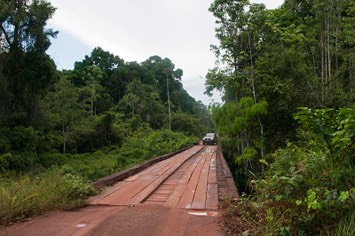
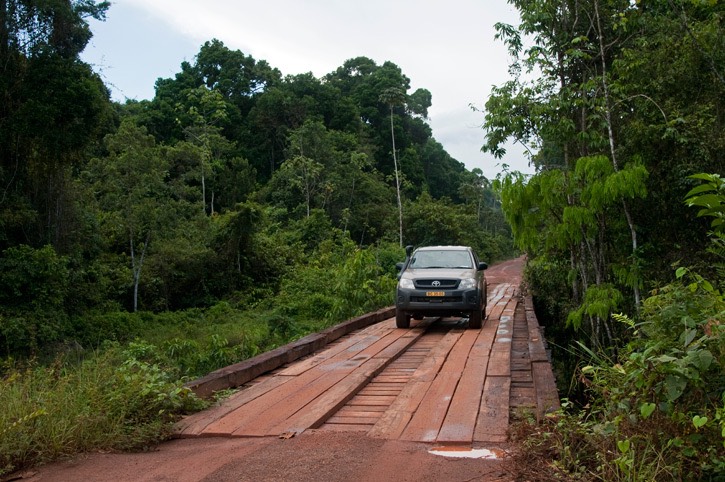
Lake obviously wanted to make sure that we got to Iwokrama in time, so he drove pretty fast. We had an interesting conversation with him, as he was very active in conservation and worked as a ranger and guide. He was currently also installing satellite dishes for the same internet provider that we use in Spain! Time passed very quickly, but there were a few dodgy sections in the track, where the soil was extremely muddy after the recent rains. One such section was on a downhill slope, where deep ruts had been created by passing trucks, one of which was actually stuck in the middle of the track and up to its axles in mud. There was no way we could help, and Lake carefully negotiated a way around the muddiest bit of track.
We arrived at the Iwokrama River Lodge and research station (www.iwokrama.org) while it was still light enough to take in the scenery. We said farewell to Lake and his two- as well as four-legged companions and were whisked off to move our bags into our room. Later we heard that in his haste to get back home, Lake had skidded off the road and got stuck, so had to spend the night in his truck! We passed the biggest building, which housed offices with an eating area on the upper level. The next wooden houses were apparently all occupied by a large group of people working for a telecommunication company in Georgetown, and because they were rather noisy, we were assigned the room furthest away from them.
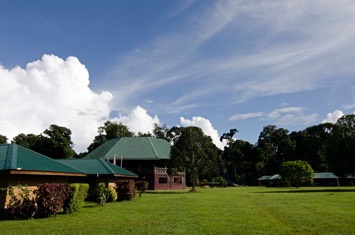
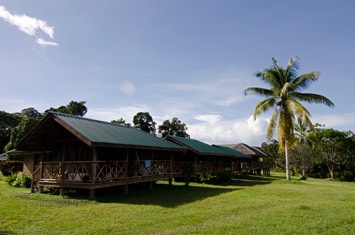
We were quite surprised to find that our “room” was a rather big building on stilts, with an extensive balcony, a big bedroom and a bathroom, overlooking the Essequibo River.
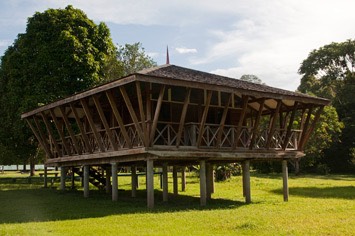
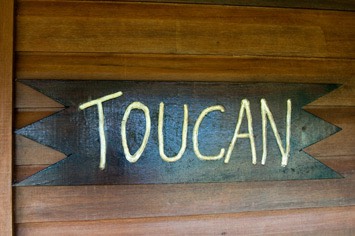
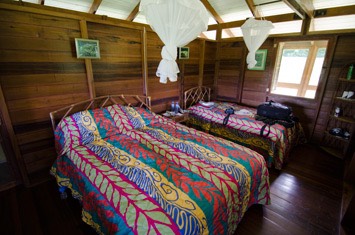
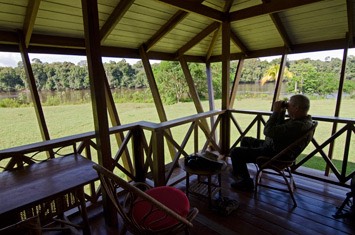
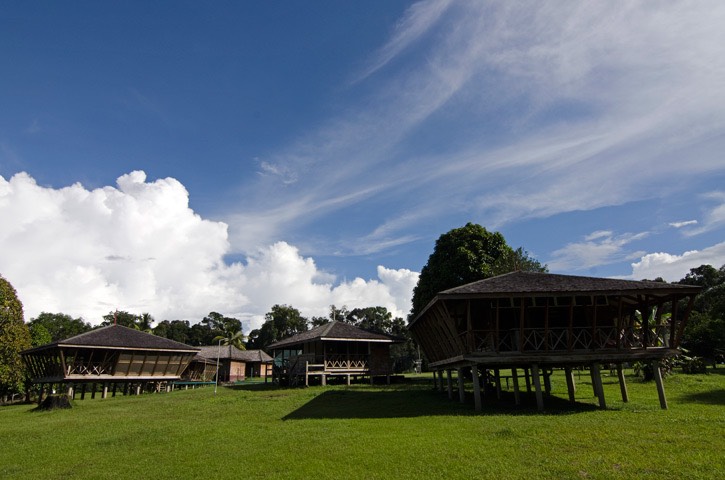
Our Amerindian guide, Alex, who turned out to be the nephew of Lake, told us to get comfortable and meet him again for dinner. Unfortunately, due to the mix-up with the transportation, there was not time to go for a walk around the lodge and research station, as had been planned in our itinerary. As soon as Alex left, the heavens opened, and it rained heavily. Luckily, by the time we had to walk over to the main building, it had stopped – we just had to negotiate the rather soggy grass! In the dining area there were separate sections for guests and for the researchers who work at Iwokrama, so we weren’t able to mingle with them as we had expected. Dinner was buffet style again - basic but very tasty - and we were entertained by bats flying around us, snapping up little insects attracted by the lights. They would often fly right past us and very low over the ground. After dinner we discussed the next day’s programme with Alex and then went off to get some sleep. In the middle of the night we were awoken by a monkey-like sound, which in the end turned out to be our noisy fellow guests, who were still partying well after midnight!
Sunday, 01/07/2012: Iwokrama
We got up while it was still dark and met Alex and our boatman just when it started to get light. We had a short boat ride on the Essequibo to get to the start of our climb of Turtle Mountain. To get there, we had to navigate through parts of the flooded forest, where the boat drove right through all the trees standing in water. At the beginning of the walk are a few empty wooden buildings, including a toilet block, where researchers can set up their hammock camp. We stopped to have some sandwiches for breakfast and, while we ate, we were treated to a special morning chorus of a group of nearby red howler monkeys. They must have been in the trees right next to the clearing and we won’t forget these sounds in a long time! We were only annoyed that we had left our sound recording device back in our room, thinking we wanted to carry as little as possible during our “climb” up the mountain… After breakfast we set off with Alex, who strode ahead wearing only flip-flops! The first bit was still quite flat, and Alex told us the names of the trees we passed and pointed out a couple of very well camouflaged leaf frogs as well as showing us the huge and infamous bullet ants.
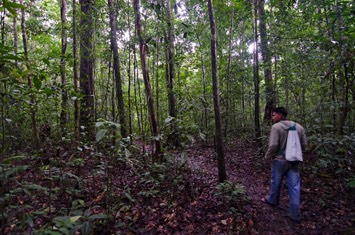
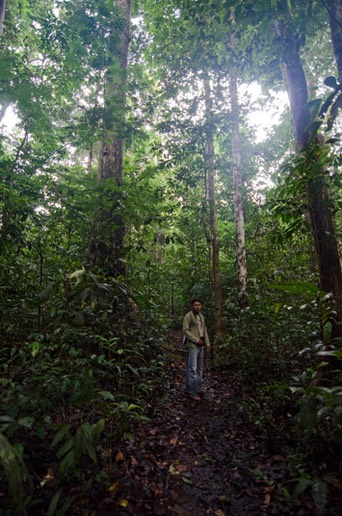
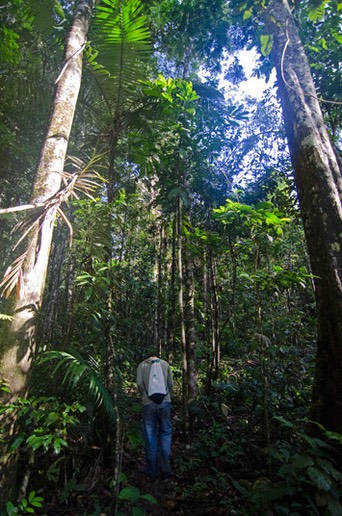
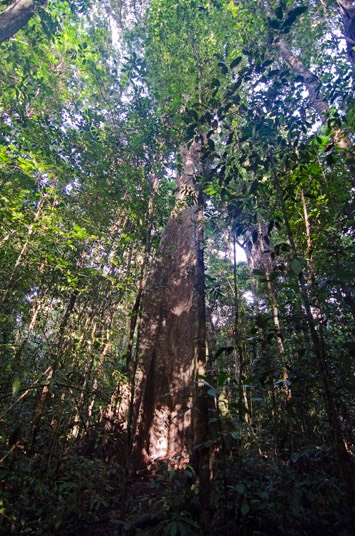
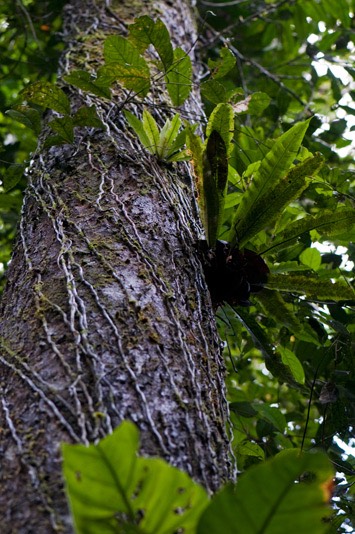
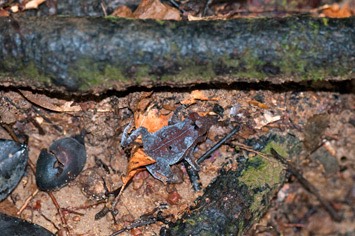
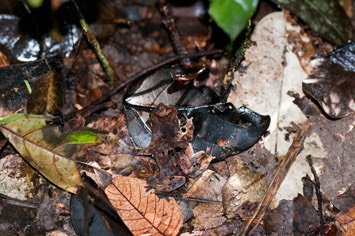
Once the climb started, Alex told us to take the lead and walk at our own pace. Climbing a 300 m high “mountain” doesn’t sound like much, but, in the extreme humidity of the rainforest, this was no mean feat! After a short spell of climbing, we appreciated Alex’s thoughtfulness in letting us choose our own speed, because we ended up stopping every couple of hundred metres, mopping the sweat from our brows! Our clothes were soaking wet by the time we arrived at the top of the mountain but the climb was well worth the effort, because we arrived at a fantastic viewpoint overlooking the rainforest and the Essequibo River.
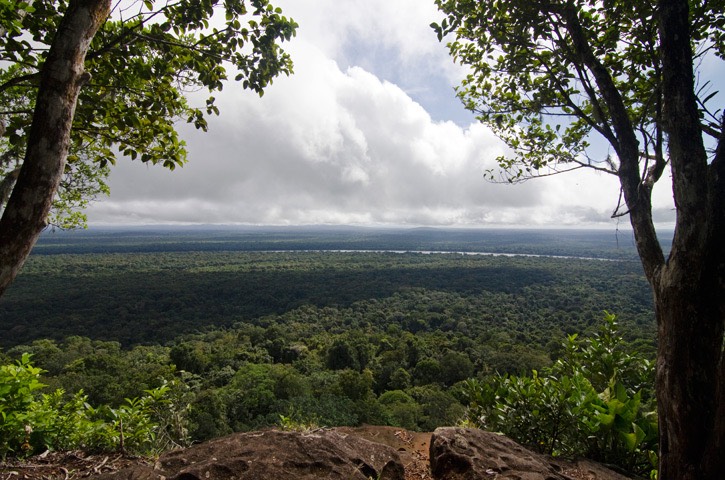
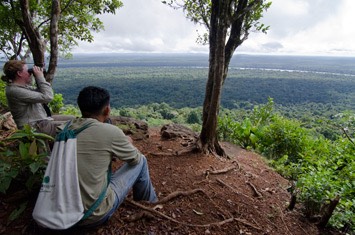
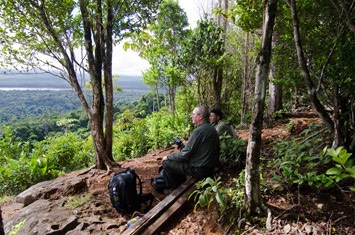
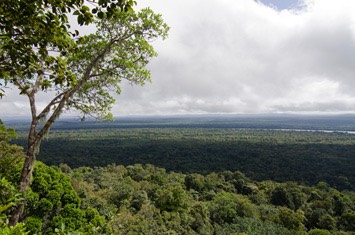
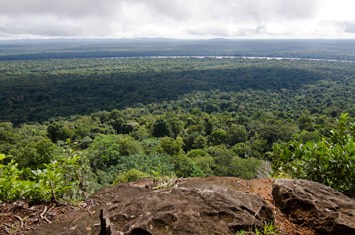
Perched in the tree above where we rested was a rare orange-breasted falcon, which we could marvel at for quite some time, as it kept returning to its perch.
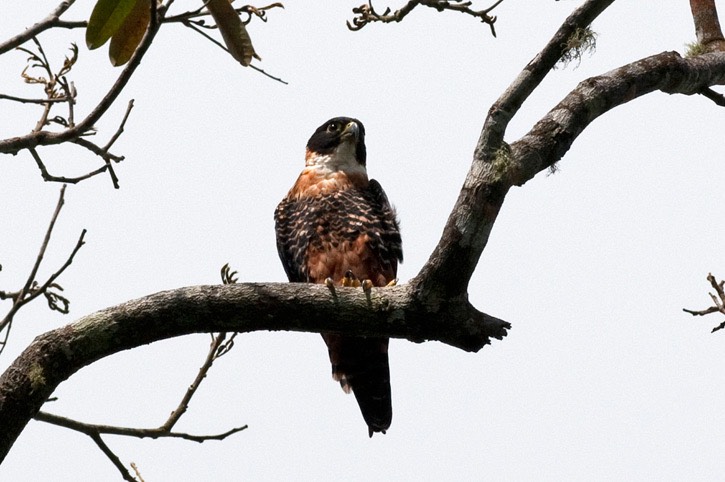
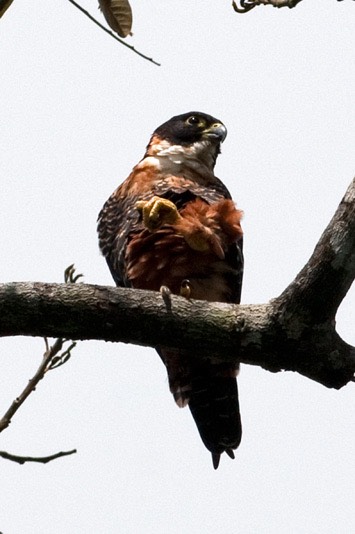
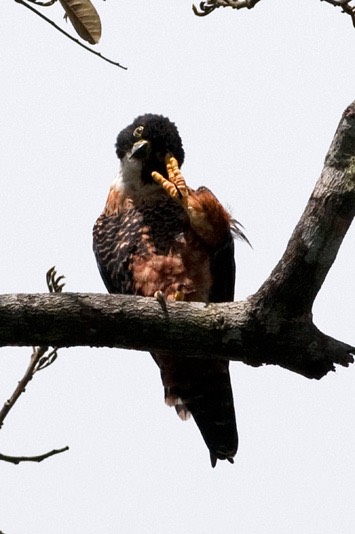
We also saw our first macaws in the distance, some vultures and a very well camouflaged red howler monkey. We didn’t stay too long, as we were supposed to get back to the lodge for lunch. The way down from Turtle Mountain was equally sweaty, but rather faster. We came across a group of spider monkeys, but they were high up in the trees and difficult enough even to see, so we didn’t even attempt to take any photographs of them.
Back at the base of the mountain, our boatman was waiting for us, ready to take us back. In the brighter light of the day, we could see the flooded forest better and were amazed how the trees survive this.
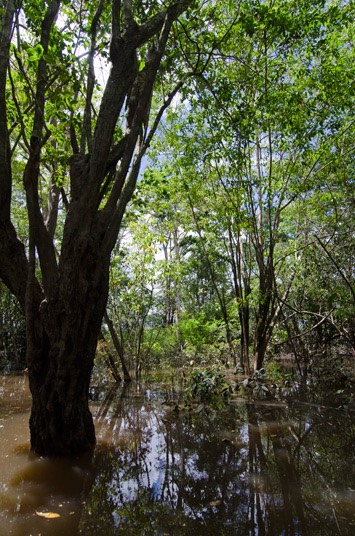
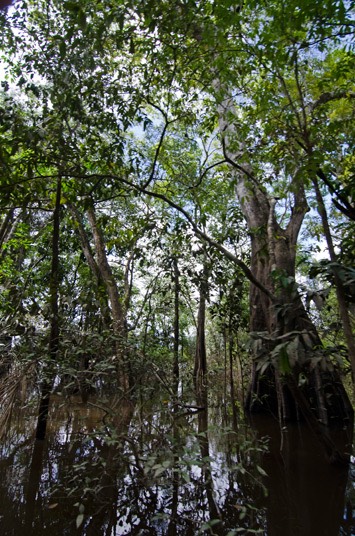
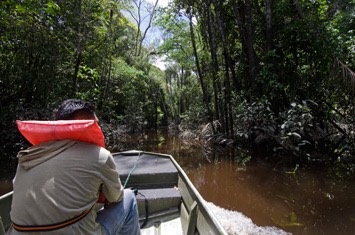
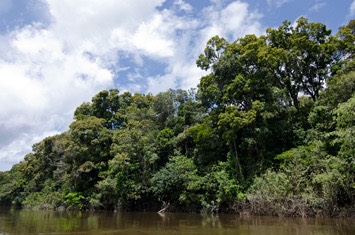
The drive back didn’t take long, but the breeze was refreshingly cooling. We arrived in time for lunch, enjoyed the view from our terrace and had a short siesta.
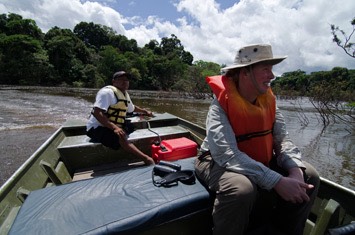
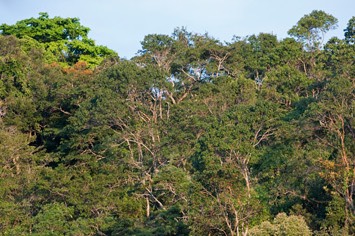
Mid-afternoon we started our second boat trip of the day. Our first stop was at the Kurupukari Falls, where our boat driver took us right through the rapids. We didn’t get many photos, as we were too concerned about the safety of our cameras…
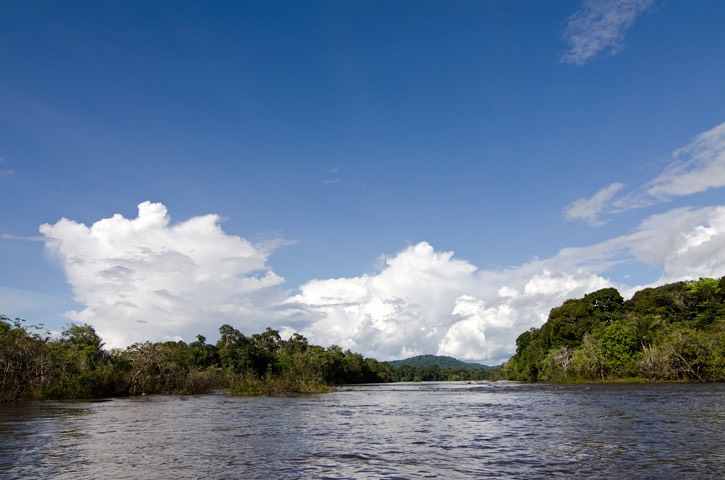
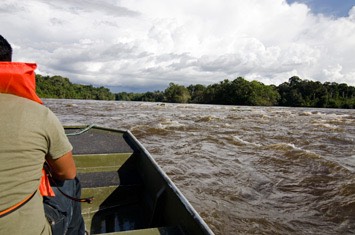
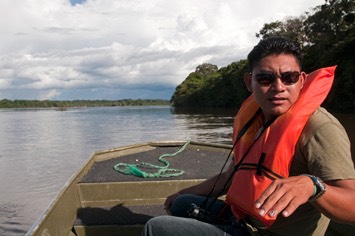
On we went, marvelling at the density of the rainforest, which comes right down to the river’s edge.
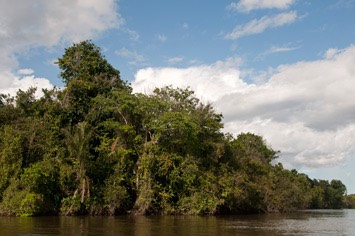
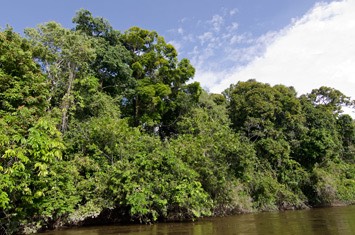
Apart from some birds, everything was quiet, so we continued to the old Amerindian petroglyphs, which were carved into a rock. We were lucky, because during very wet rainy seasons, this rock can be totally submerged. The petroglyphs were amazing, and Alex and Mick got out of the boat to have a closer look at them, climbing around between the rocks.
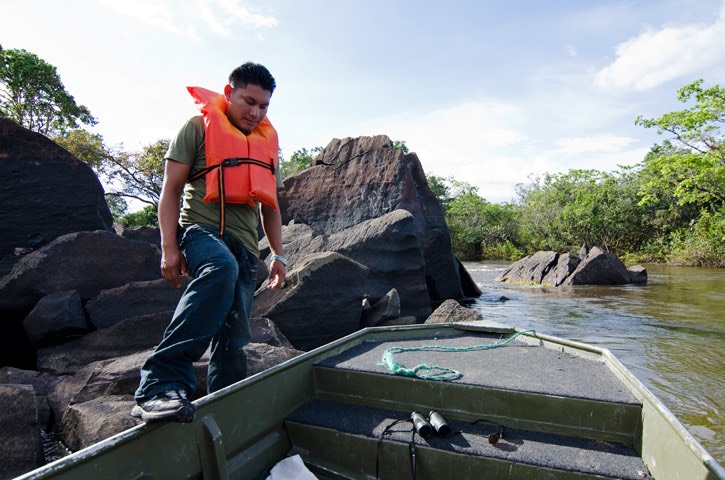
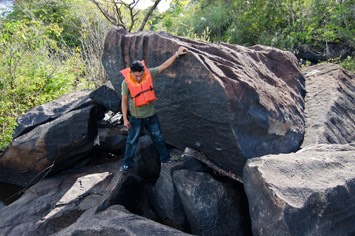
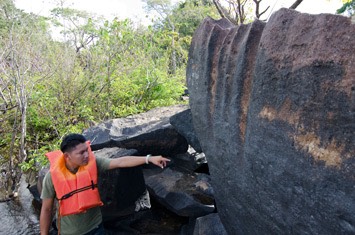
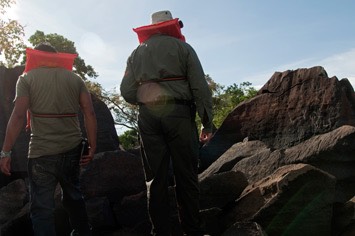
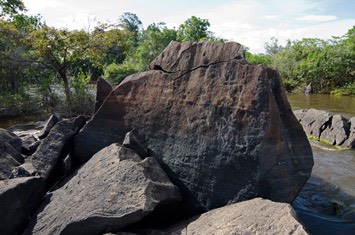
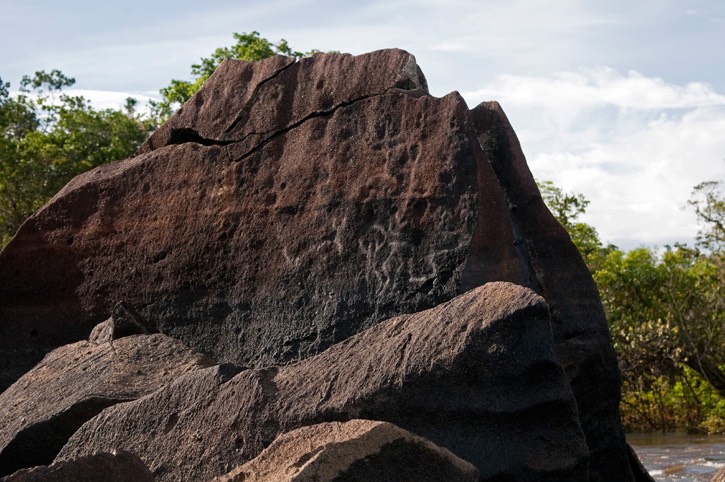
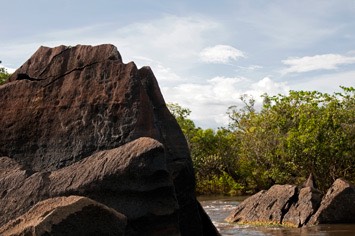
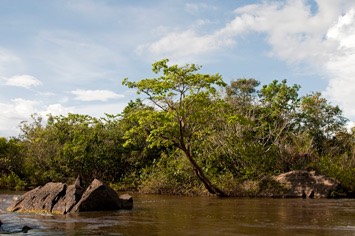
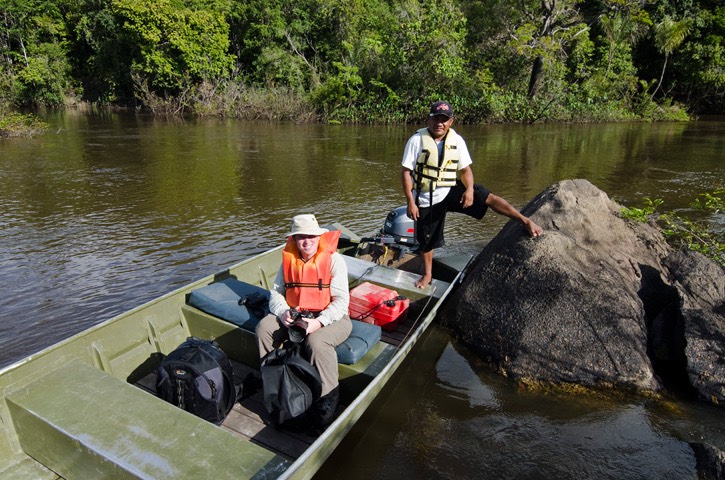
On we went, passing the rapids a second time on our trip. We saw the old-fashioned ro-ro ferry, which crosses the river. Apparently, this is part of the main “highway” connecting Georgetown with Brazil, and all traffic, including the lorries, had to cross the river on this ferry.
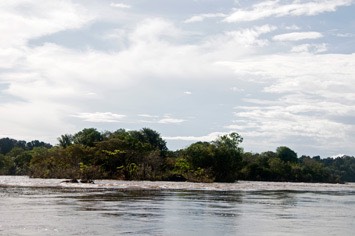
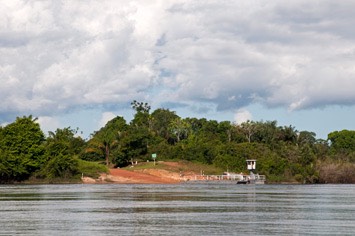
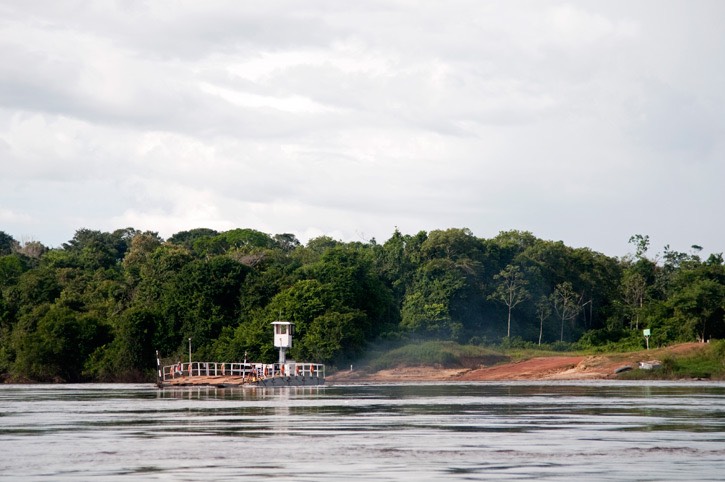
We were then dropped off at the Amerindian Village of Fair View, where a pick-up truck and driver awaited us.
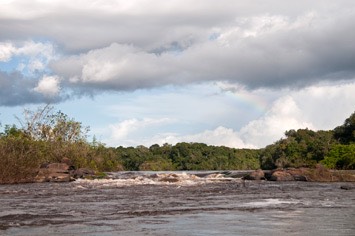
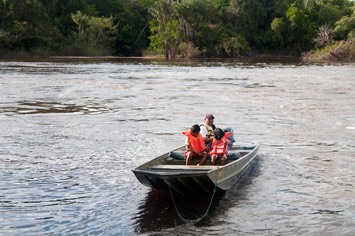
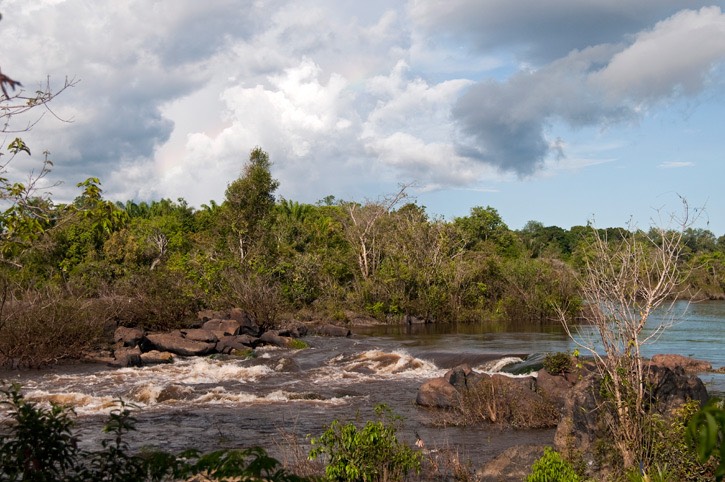
We set off down the main track, hoping to catch a glimpse of a jaguar. As it was still bright daylight, we got out of the car at a little clearing and scouted the area on foot. Apparently it was an area where tapirs are often seen, and although we missed the animals themselves, we found their footprints and poo. We hung around until dusk and then started our night drive back to the lodge. We were very excited about the prospect of a night drive and, again, hoped to see a jaguar, but the whole experience deteriorated rather quickly. We thought that we would take our time and drive slowly, spotlighting as we went. However, it turned out that we ran according to a tight schedule and had to be back for dinner which started less than one hour after dark. Therefore, the driver was in a rush to get back and drove rather faster than it felt safe on the dark and muddy track. Also, the only light we had came from the rather muddy headlights of the car, which hardly illuminated the track a few metres ahead of the car, so we couldn’t see very far at all. We came across a few agoutis, but because we came racing along and never slowed down, Maren, who sat on the backseat, could barely catch a glimpse of them. Needless to say, the jaguars had more road sense and stayed well clear of our car coming along at high speed!
After dinner we retreated to our house on stilts and, after this action-packed day, we were asleep in next to no time!
Monday, 02/07/2012: Iwokrama – Atta
Our schedule for the day said we would leave early and try to spot jaguars again in the early morning. However, by the time we had an early breakfast and our driver turned up, it was already quite late and the best jaguar spotting time was probably over already. Our transfer to Atta Rainforest Lodge again was less a leisurely drive than a race to get us there quickly. The turn-off to Atta was a little track disappearing into the rainforest, and soon after that our way was blocked by a fallen tree and another car. The tree was too substantial to cut up with machetes, so our choices were to wait, in the hope that somebody would return with a chain saw, or to walk. As we were quite close to the lodge, we decided to walk, especially as Alex and the driver offered to carry our heavy bags.

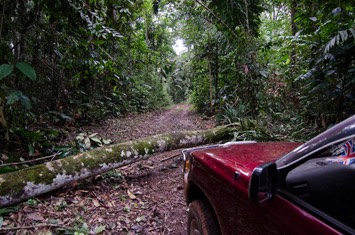
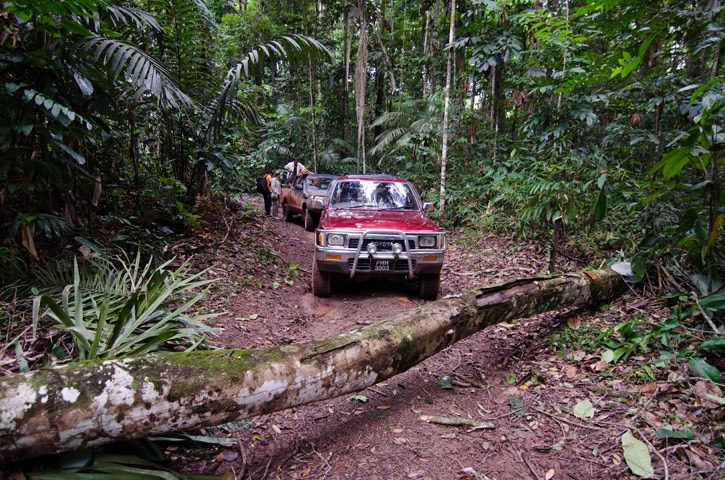
Atta Rainforest Lodge (http://iwokramacanopywalkway.com/atta-rainforest-lodge.html) is located in a small clearing in the middle of the rainforest. We were welcomed by our guide, Cassius, and one of the guys from Rock View Lodge, who was there with some clients who were on the Canopy Walkway. Atta consists of an open main house as well as several bungalows. We were shown to the “Black Spider Monkey” room, the walls of which didn’t reach the roof so the space above was open to the neighbouring rooms! It also had an attached outdoors bathroom, so we felt almost as if we were showering in the middle of the rainforest.
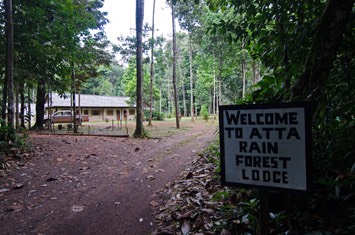
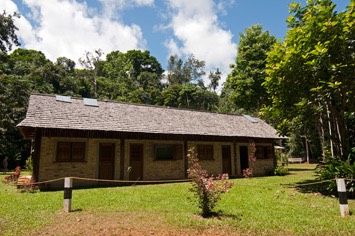
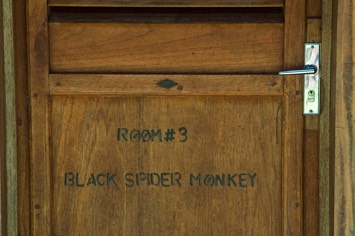
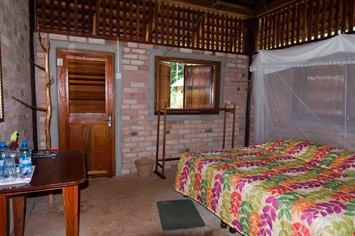
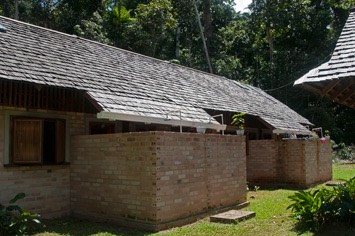
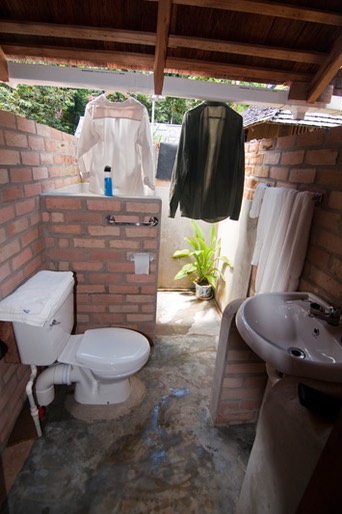
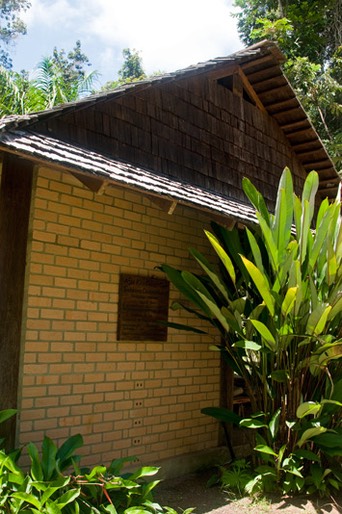
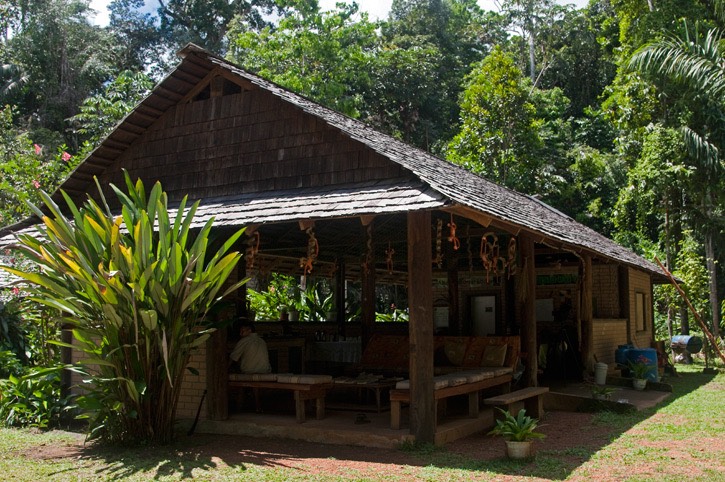
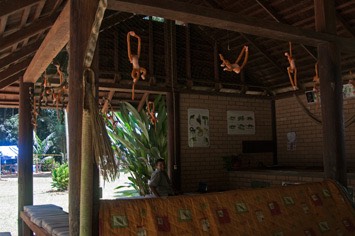
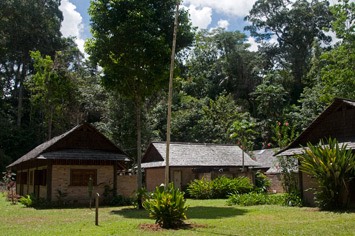
After a short break, during which we did our laundry, we straight away set off for our first walk. Several tracks led directly into the rainforest, and within a few steps we were in a different world of tall trees.
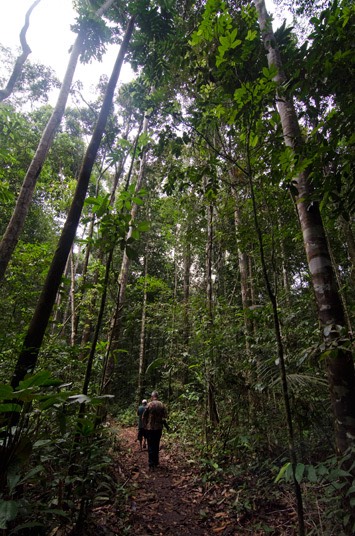
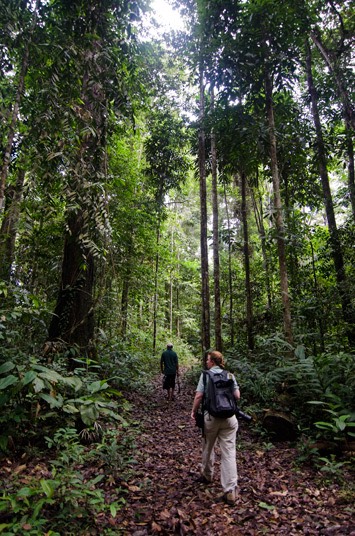
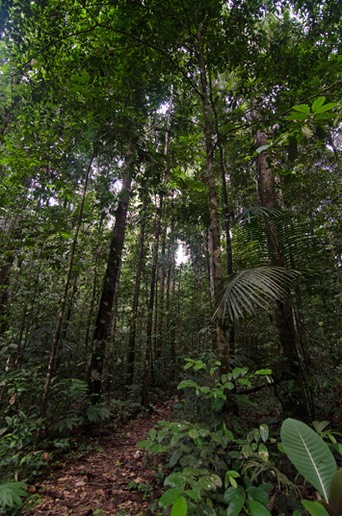
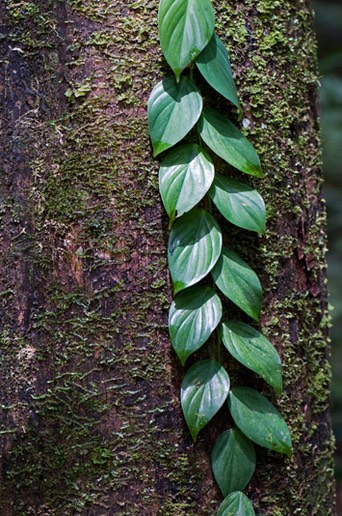
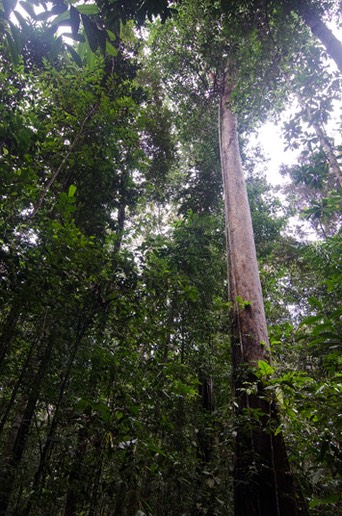
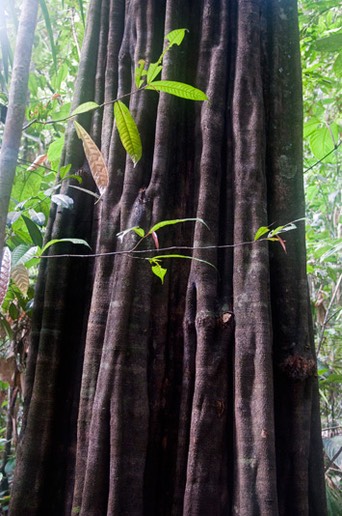
Not far down the track Cassius demonstrated the “talking trees”, a species of tree with buttress roots, which, when hit with a thick piece of wood, generates an impressively loud booming sound. These sounds can be heard over quite large distances and Cassius would later use them on all our walks to signal our return to the lodge and request cold drinks to be ready.
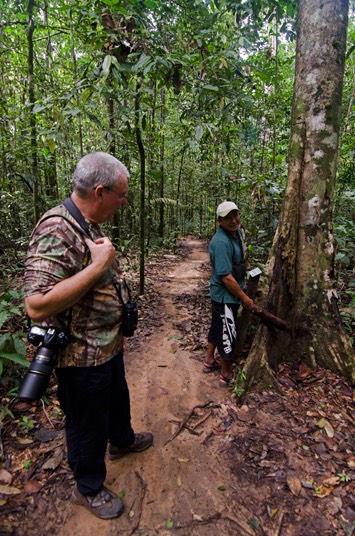
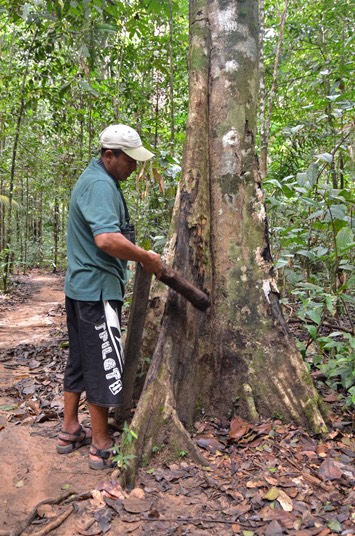
He also showed us how to split strands of liana, which can then be woven into furniture, like the ones in the lodge.
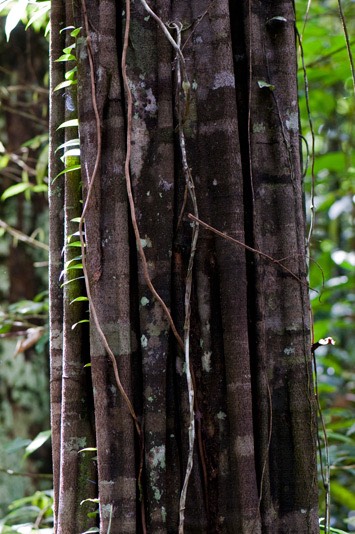
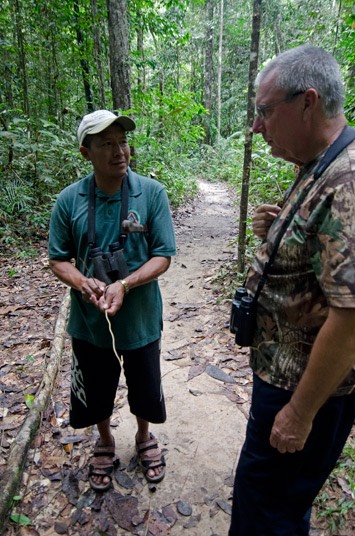
Besides the liana there were all sorts of amazing plants to look at: lots of different species of tree, creepers growing up on them, seeds, seedlings, fungi and many plants we couldn’t easily identify. The sizes of leaves ranged from tiny to enormous. We also found some pretty butterflies and some spiders.
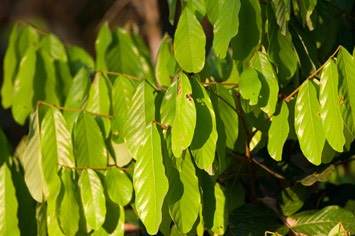
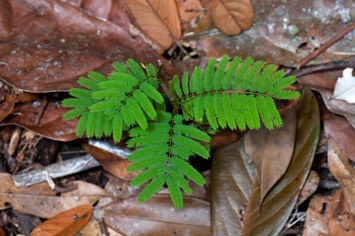
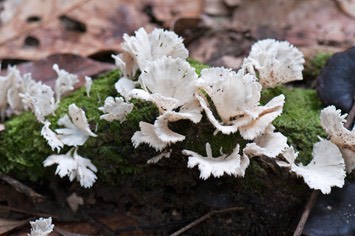
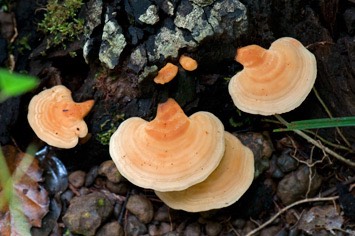
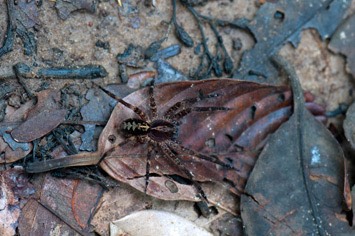
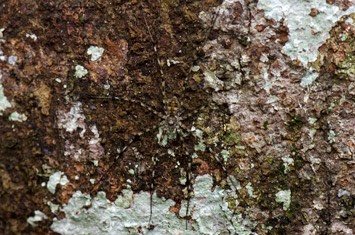
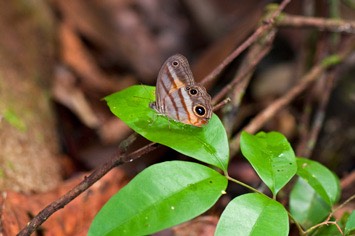
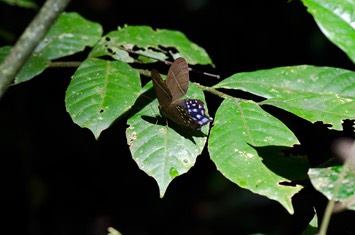
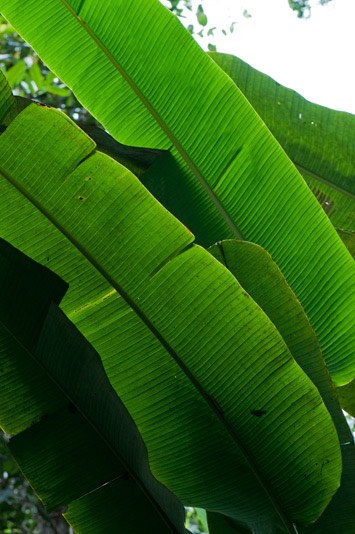
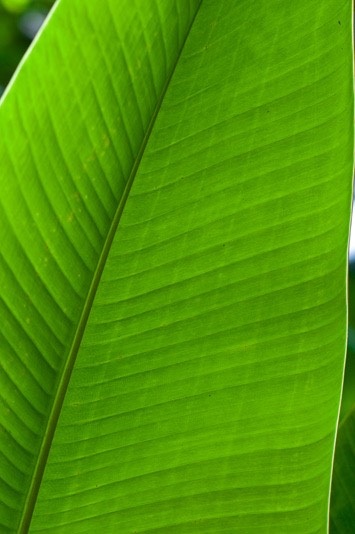
There were also some more little frogs, which were extremely well camouflaged against the leaf litter on the ground.
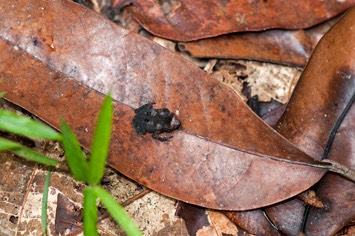
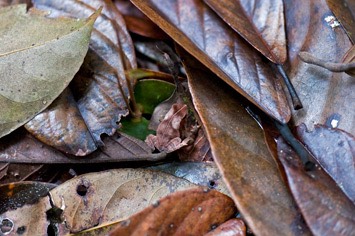
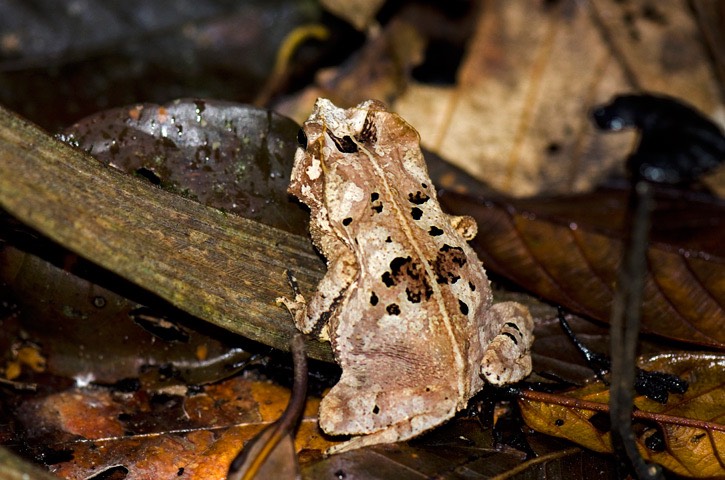
Near the lodge, there was yet another rainforest roadblock, where a somewhat smaller tree had fallen onto the track. Cassius got his cutlass out and started chipping away, soon cutting the tree into two halves, so we could pull one away and continue on our way.
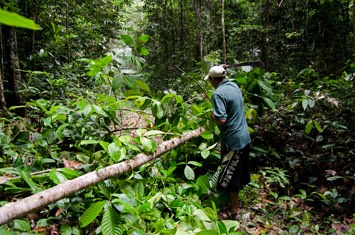
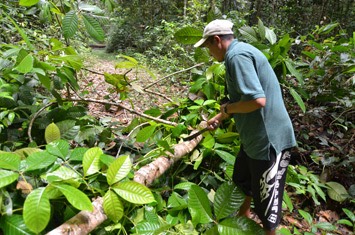
It turned out that we were the only guests at the lodge. Another couple had booked in, but they never turned up. Atta Lodge was run by only three people: Cassius, a lady who was cooking for us and a young lad. Lunch was simple but delicious and afterwards we had a short break in our room. Then we spent a bit of time photographing the stunning hibiscus plants and looking around the clearing for photo opportunities. We always kept a worried eye on the skies, as they at times seemed to threaten rain. It was amazing to see how, despite the heat, our clothes wouldn’t really dry, due to the high humidity. In the end it took nearly the whole of our stay there for them to dry reasonably well.
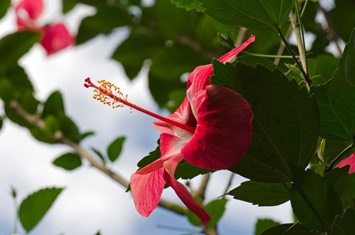
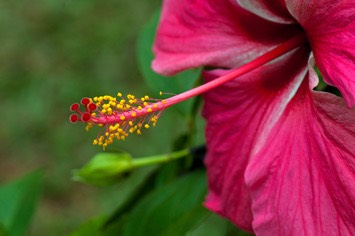
In the late afternoon we set off for our much-anticipated first visit to the Canopy Walkway (www.iwokramacanopywalkway.com). Maren was a bit apprehensive about getting up the 30 m high structure, being a bit worried about heights. However, it turned out that the construction of the Walkway was very cleverly done, using the slope of the land. We climbed up a hillside, from which the Walkway was then built out above the valley below. It consists of four platforms built around trees with suspension bridges in between them, which are at heights of up to 30 m and more than 150 m long in total. The whole construction is fixed with steel cables, which are wrapped around the trees in such a way that they won’t hurt the trees nor stop them from growing. Only one person was allowed on each bridge at any one time, and although they moved a bit, they still felt very safe, due to high netting on both sides. We went to the highest of the platforms and made ourselves comfortable there.
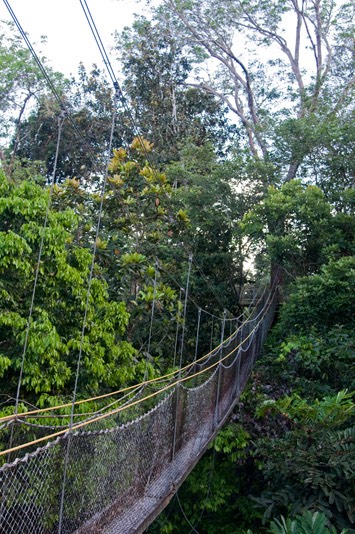
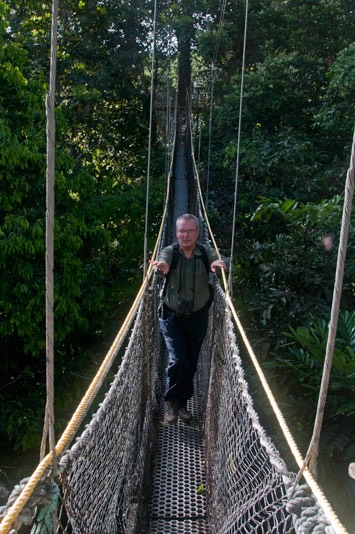
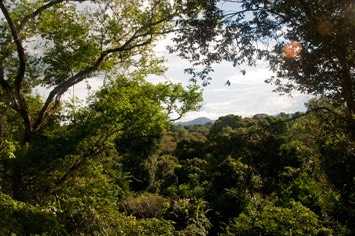
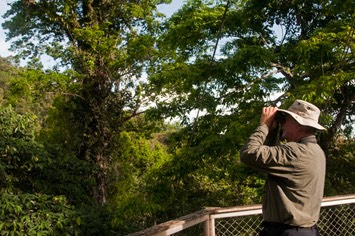
We had a fantastic view over the rainforest, which was lit in beautiful evening light. At one point two macaws flew over the top of us, but we just stood there looking at them in awe, so that we completely forgot to take a photo of them. As it turned out, this was our best sighting of them during our entire stay at Atta! Never mind, it was a wonderful experience. We saw plenty of others birds, but not many came close. It was quite amazing to be at eye level with the tops of so many tall trees and it was a bit scary to look down to the dark abyss of the forest floor.
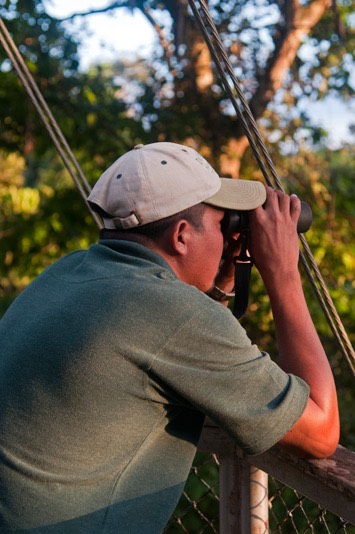
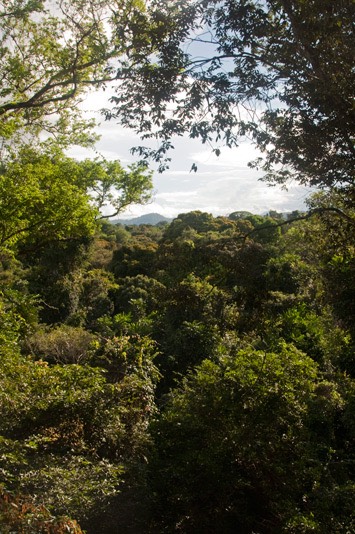
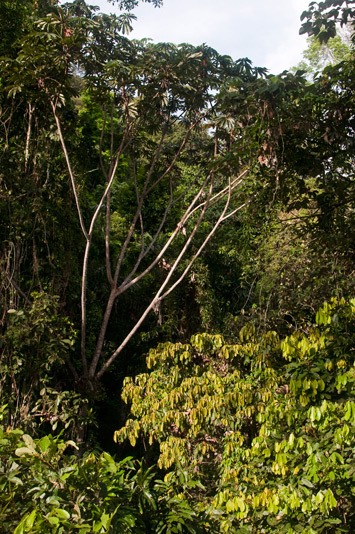
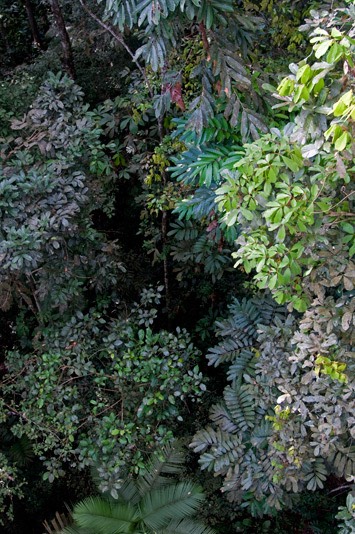
We even caught a glimpse of a red howler monkey, although to us it was just a little reddish blob in the trees! When it started to get dark, we headed back towards the lodge. In the beam of his torch, Cassius found a beautiful white and black striped snake. It wasn’t very big and quickly disappeared into the undergrowth. After our exciting trip on the Canopy Walkway, we enjoyed dinner with Cassius and then fell into bed.
Tuesday, 03/07/2012: Atta
We were woken in the early hours of the morning by a chorus of howler monkeys. They weren’t as close as those at Turtle Mountain, but it was great to hear them again. We managed to sleep a bit more and then met Cassius for a few biscuits and some coffee before setting off for our early morning walk to the main road. As soon as we got there, we spotted some fairly fresh jaguar prints, but the jaguar itself remained elusive.
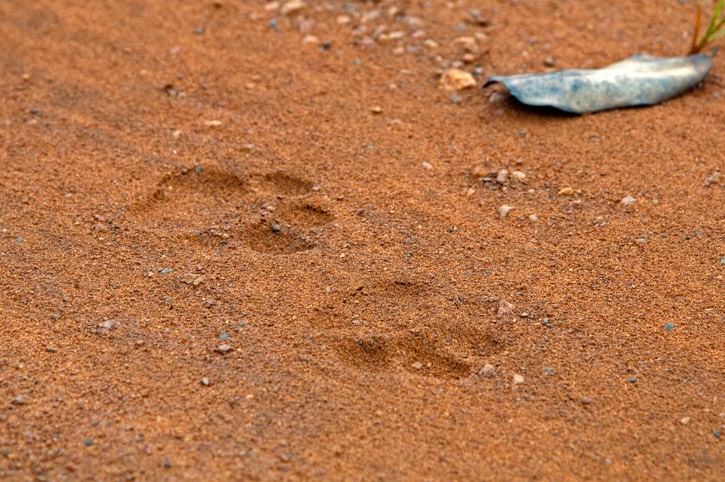
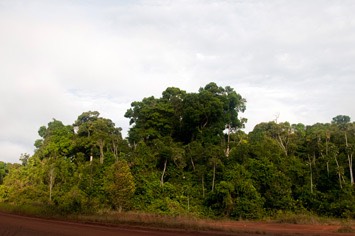

The birds started to get up and we saw a red-breasted toucan and a couple of toucanets in the palm trees close to the road. Unfortunately, the light was still too poor to get any really nice photos of them. Nevertheless, we enjoyed watching them and several other species of macaws and parrots. However, we always had to keep one eye on the road, as the few cars and trucks that were on the road drove at breakneck speed.
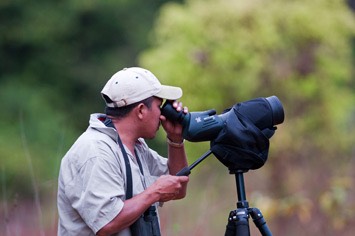
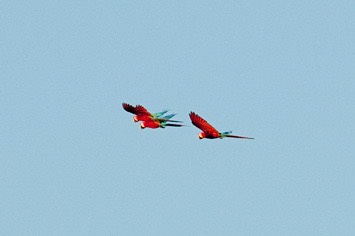
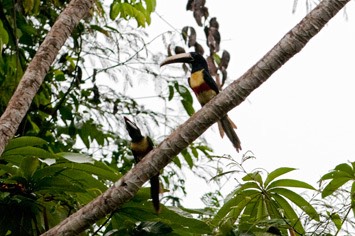
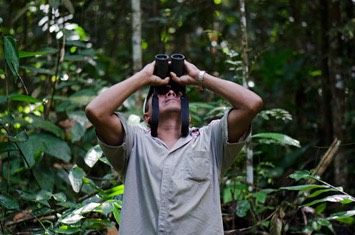
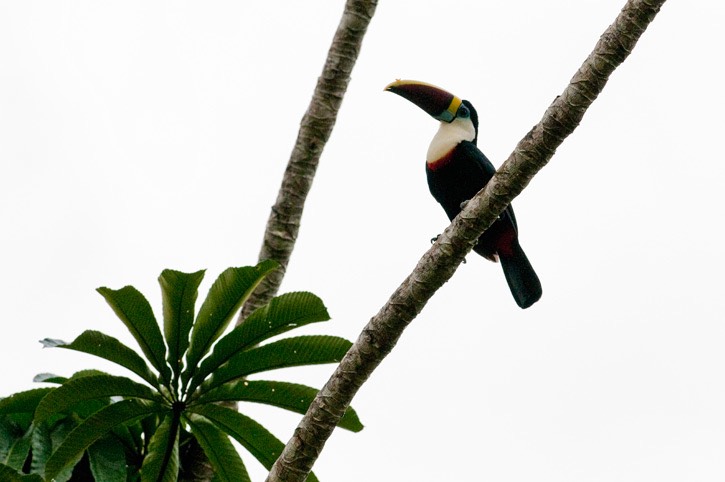
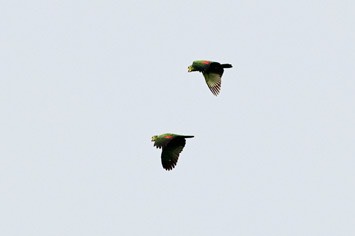
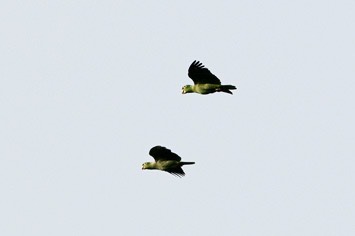
We returned to the lodge for breakfast before setting off again for another walk into the rainforest. Taking photos in the rainforest is not so easy, as it is generally rather gloomy, apart from shafts of very bright light coming through gaps in the trees. However, the diversity of a rainforest is amazing, with really tall trees right next to little seedlings and leaves nearly as long as Mick’s arms!
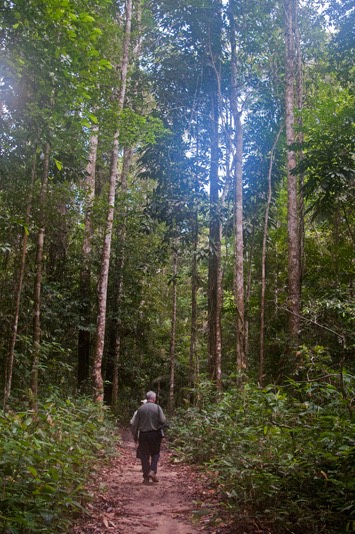
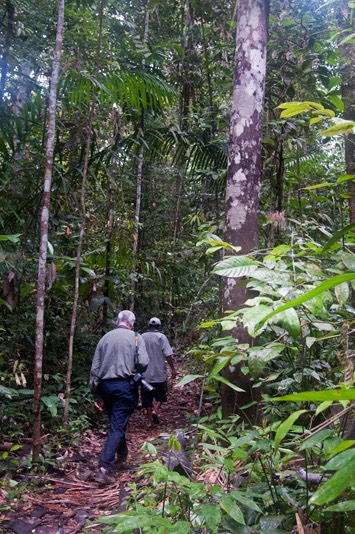
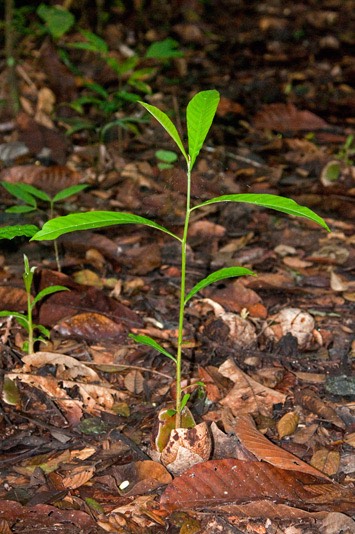
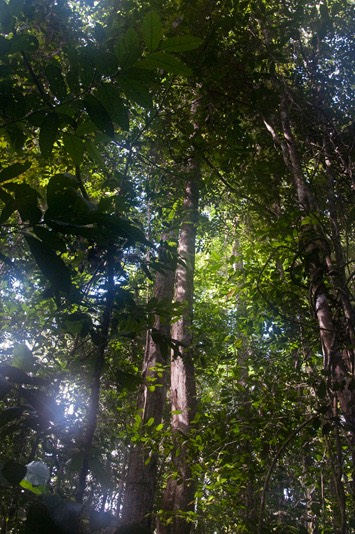
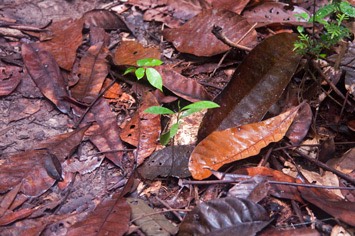
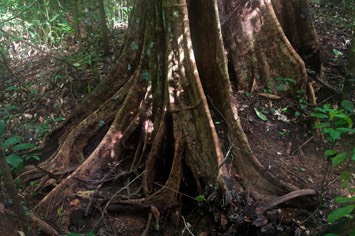
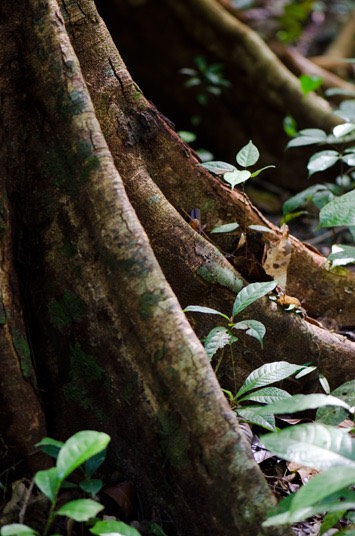
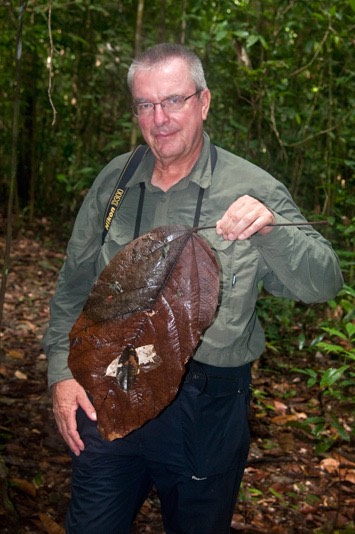
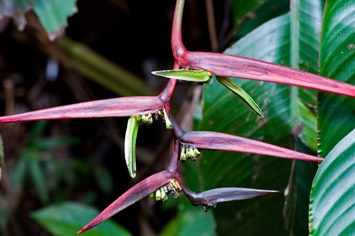
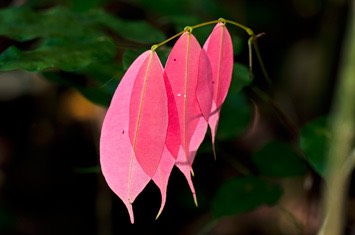
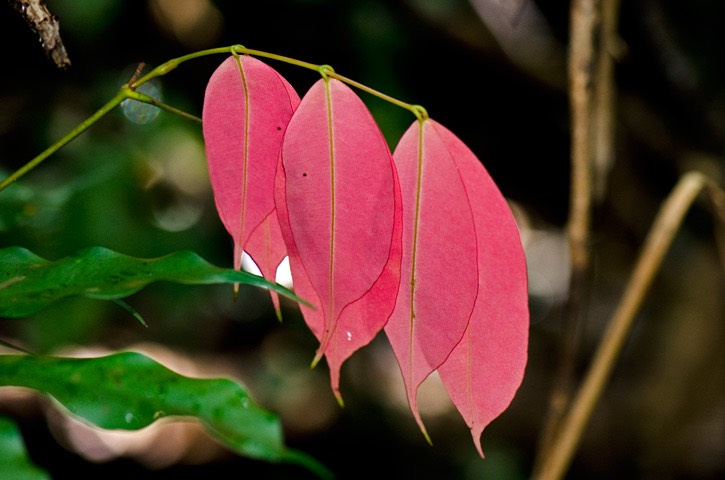
On this walk we had to cross a couple of little streams, balancing on fallen logs. At one point we came to a bigger stream, crossed only by a fairly large fallen tree! We didn’t really fancy balancing our way across it, so we were happy when Cassius waded through the stream to recover a piece of steel grating to be used as a bridge. He then climbed up on the fallen tree and told us that he had often seen a small anaconda lurking in this part of the stream!
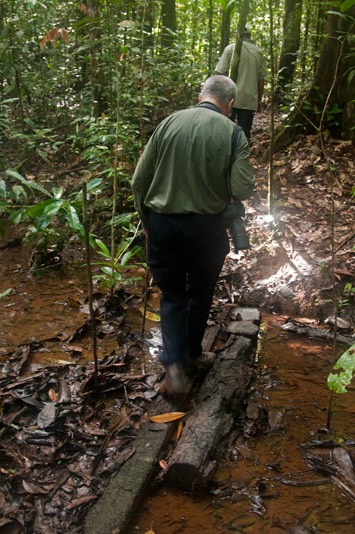
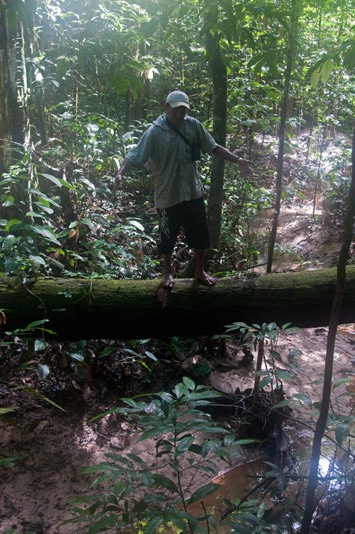
At one point we walked underneath the Canopy Walkway, and it was interesting to see how high up in the trees we had been the day before. We could also appreciate the work that had gone into the construction and how the steel wires were fixed to trees and the ground.
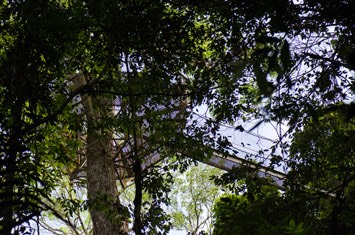
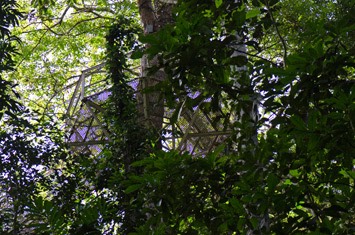
Spotting mammals in the rainforest was not easy; at some point we heard something crash through the undergrowth and Cassius thought it was a red brocket deer, but we never caught a glimpse of it. Even spotting birds is not always easy. However, we came across one of the birder’s highly prized rarities, and while Mick managed to spot the little, fairly non-descript bird in the leaf litter quite quickly, Maren struggled for ages trying to follow the “next to the big leaf by the little twig” instructions. Eventually she saw it too, but we felt that for us the bold and colourful parrots, macaws and toucans were much more interesting.
The talking tree announced our return for lunch, and afterwards we retired for a little snooze. At some point Maren got up, only to find her naked feet surrounded by columns of moving ants! Several ant highways criss-crossed the room and disappeared through the door. By the time Mick had woken up properly and realised what Maren was talking about, there was not a single ant to be seen! Quite a spooky experience and lucky for Maren that she didn’t get stung! We spent the afternoon photographing butterflies that came to feed on lantana plants near the lodge, as well as a huge beetle and some of the rather shy lizards.
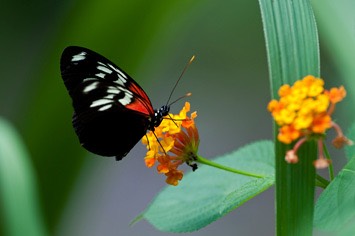
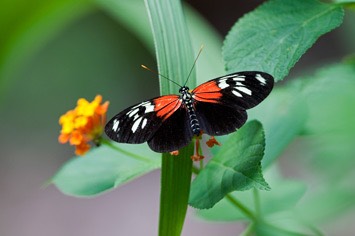
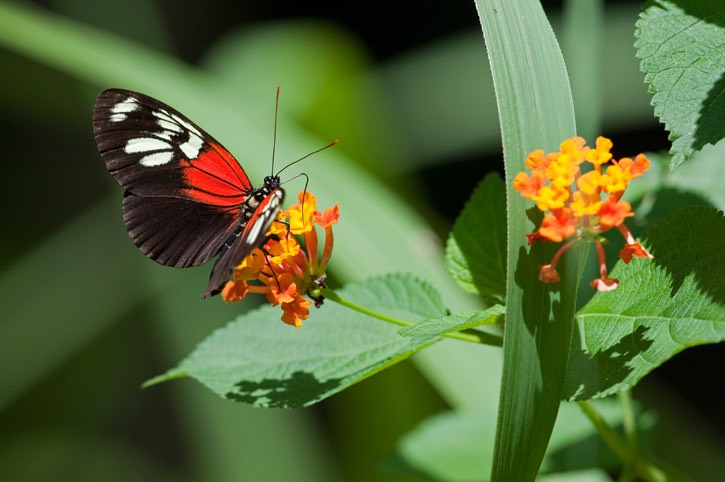
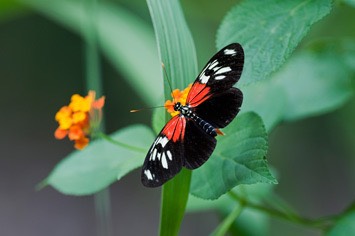
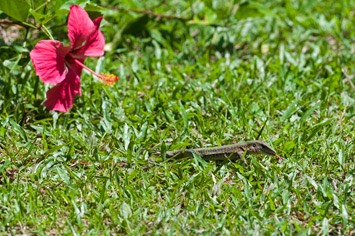
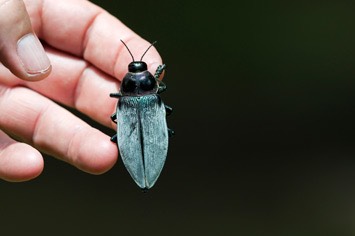
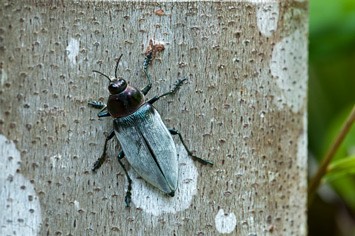
In the afternoon, a guy in wellington boots turned up on a motorbike, and after inspecting some of the buildings, Cassius introduced him to us. It turned out to be Sydney Allicock, who is involved in Surama and who is also a very influential Amerindian member of parliament! Apparently, he holds the deciding vote in there. He told us all about a visit to Germany, during which he met with several members of the Green party. We had an interesting, wide-ranging conversation with him, although it felt a little surreal to be chatting with a member of parliament wearing wellington boots in the middle of the rainforest!
In the late afternoon we set off again towards the road, where we had another look at the jaguar footprints. Only a bit further down the road we came across some jaguar poo, and we were amazed to find the foot of a turtle as well as an armadillo claw in it!
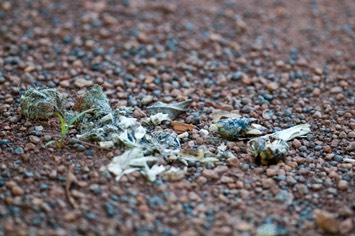
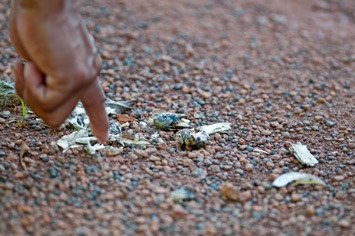
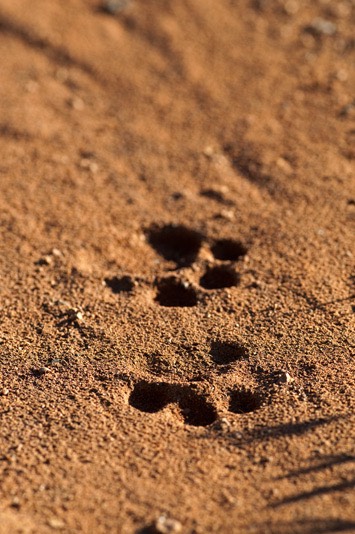
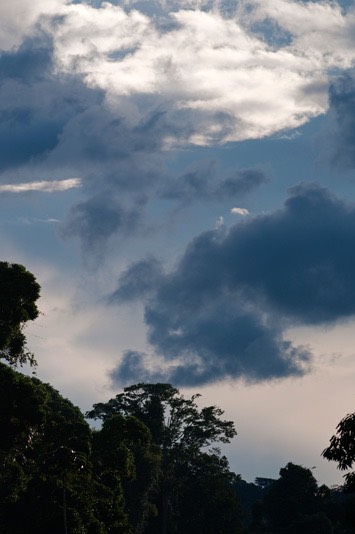
We walked along the road and as evening fell, quite a few parrots and macaws flew over. The squawking parrots were especially good fun to watch, while the macaws, unfortunately, stayed just a little bit too far away. There was quite a lot of water close to the road and, when it had turned really dark, we walked home spotlighting at these wet patches. No mammals turned up, but we did see the eyes of a small black caiman. Back at the lodge, we found a large toad guarding our room.
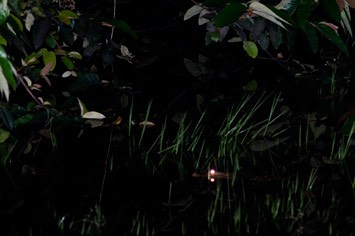
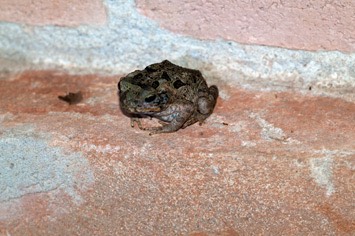
Wednesday, 04/07/2012: Atta – Rock View Lodge
Another early morning start in order to get to the Canopy Walkway for the morning chorus of the birds. Climbing up the hill in the dark and only using our small torch was a bit of a challenge, so we were happy when we arrived at the first platform. It was amazing to see the world be transformed by the first rays of the sun.
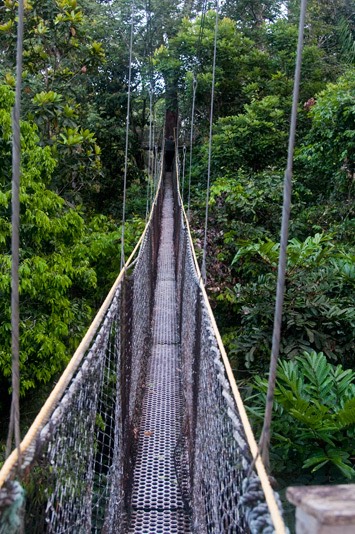
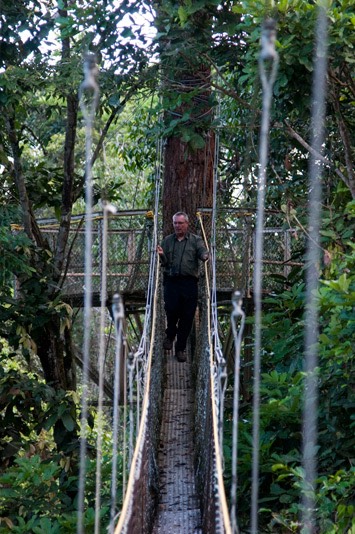
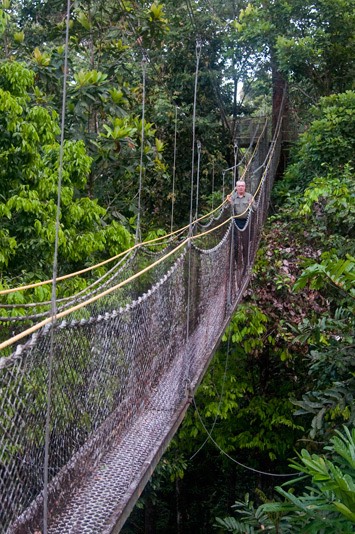
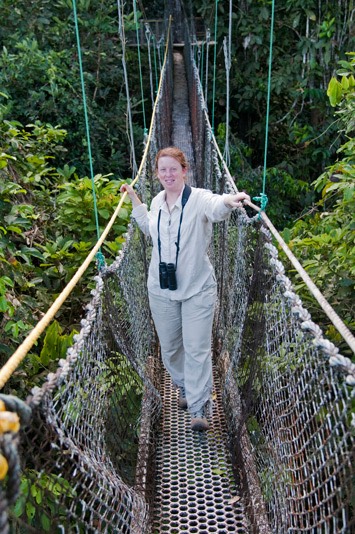
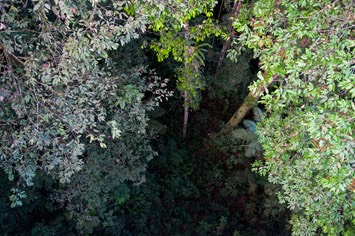
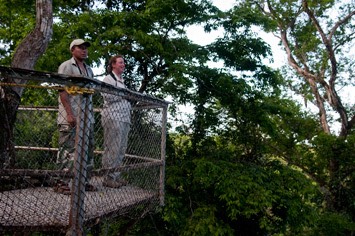
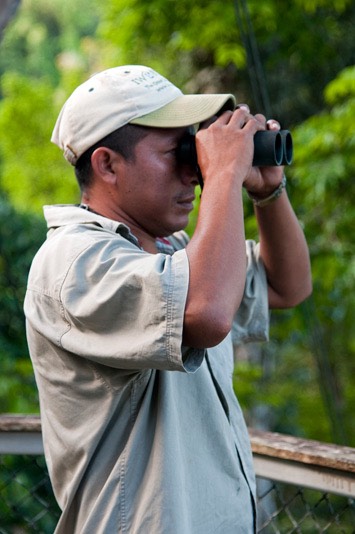
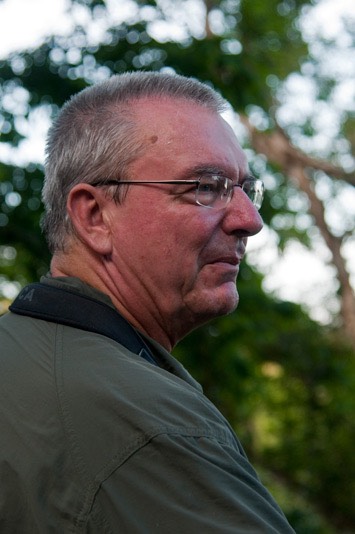
We again saw a lot of parrots and some distant macaws, but nothing came anywhere close to us. However, Mick had brought his sound recorder along and made some long recordings of the birds singing.
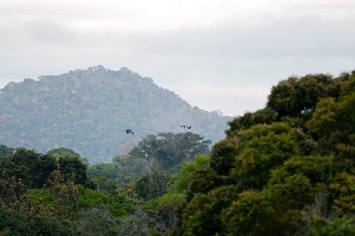
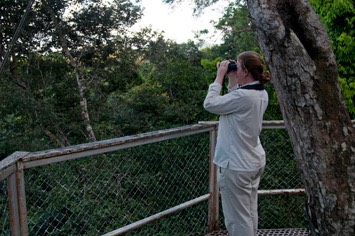
Once the sun had fully risen, things started to slow down and we decided to head back to the lodge to have breakfast before we were to be picked up for our transfer to Rock View Lodge. On the way back we spotted a beautiful woodpecker with a bright red head, which all too quickly disappeared behind the trunk of a tall tree.
After breakfast we were treated to a visit by one of Atta’s resident black curassows, which came looking for little treats. These birds are quite massive and look very handsome with their curly feathers on top of their heads. We quickly got the already-packed camera out again and took a few photos. While we were doing that, our transport arrived. One of the sons of Colin Edwards, the owner of Rock View Lodge, came to pick us up. We had already met him on the day we arrived. We bade our farewell to Cassius, a very friendly and impressively knowledgeable guide, wishing that one day we could go out into the rainforest with him again.
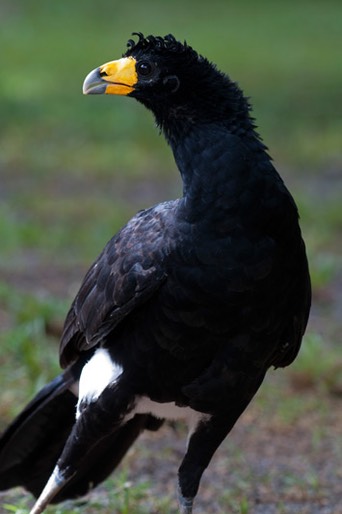
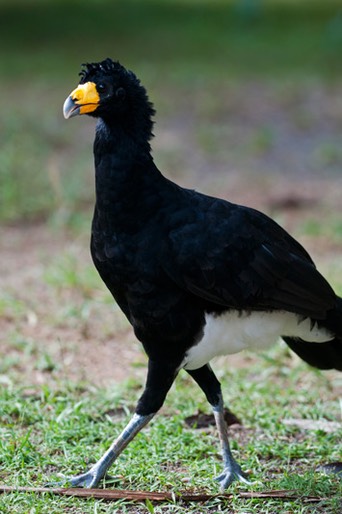
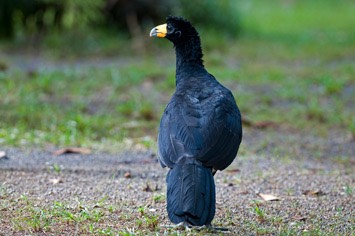
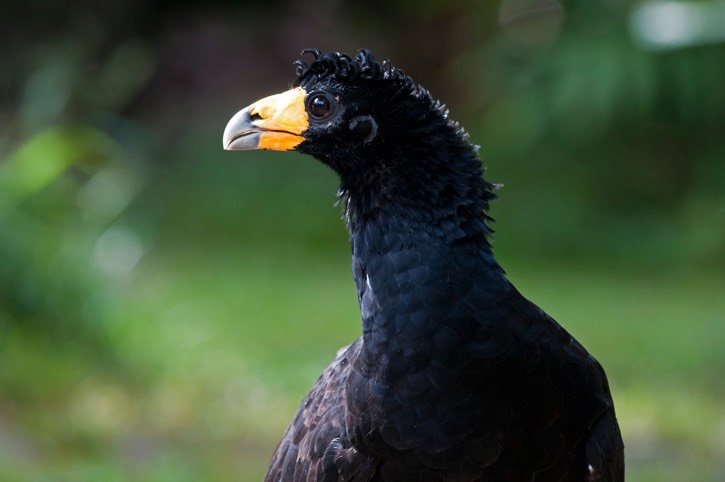
The drive back to Rock View Lodge was at a more leisurely pace than our previous drives, so this time we could properly appreciate our surroundings. Shortly after being passed by a very fast truck we came across a snake on the road. It was a pretty, squeaky-green snake, standing out against the red soil of the road. At first we thought it was only sunning itself, but it quickly became clear that it had been run over. What a shame! Closer towards Rock View Lodge we came across Sydney Allicock once more, wearing his obligatory wellington boots, oiling the chain of his motorbike by the side of the road!
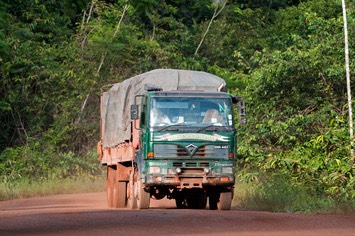
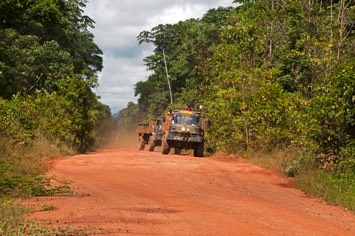
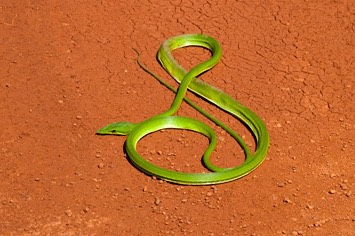
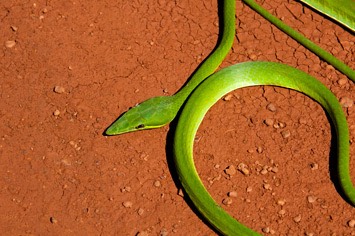
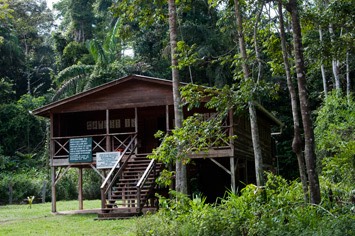
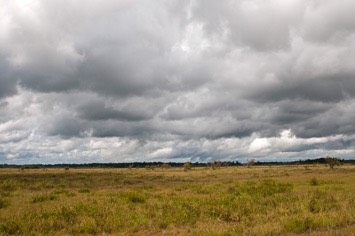
We were welcomed by Colin Edwards and were shown to our room, which included a big bed and another smaller one up on a mezzanine. The bathroom had a big shower and at certain times of the day the water coming out of it was hot! That was a luxury we very much enjoyed after all the cold showers we had at Iwokrama and Atta.
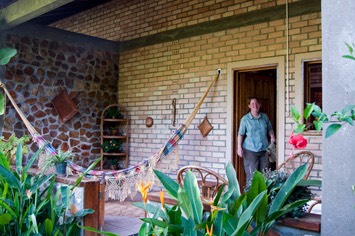
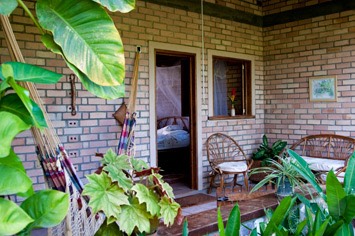
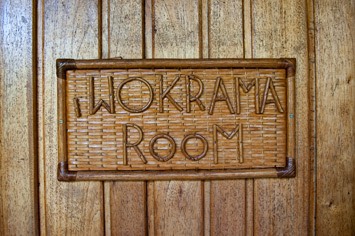
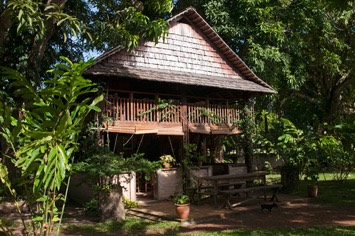
Hendricks, the local Amerindian guide, gave us a quick tour of the grounds, which was cut slightly short by a sudden shower of rain. Nevertheless we managed to see the graves of Colin Edwards’ parents, the extensive library in his house, the vegetable garden and the famous Dakota Bar, in which Colin’s wife works. Afterwards we had lunch, which was presided over by Colin Edwards himself. He is a somewhat eccentric character, who regaled us with stories of his life. The other guests present were a couple from Switzerland, who had shipped their campervan across the Atlantic and who had toured through all the South American countries. They had lots of interesting stories to tell, so time flew by. Later we dropped some laundry off so that we would have something clean to wear when we returned to Georgetown. In the afternoon Hendricks took us for a walk, which included a climb up a nearby small hill. The incentive for the climb up some steep and at times slippery rocky steps was to find poison arrow frogs at the top.
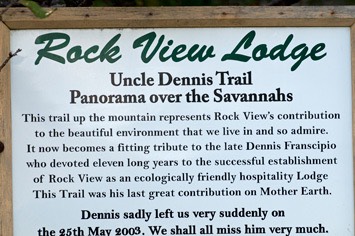
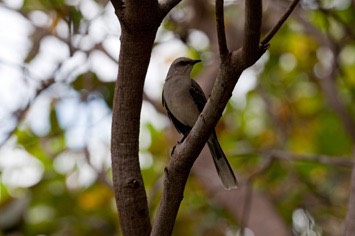
We arrived on the top rather sweaty, but Hendricks immediately found a bright yellow and black poison arrow frog in a crack in the rocks. He managed to “convinced” it to come out, so we could have a good look at it, before it escaped at the first opportunity.
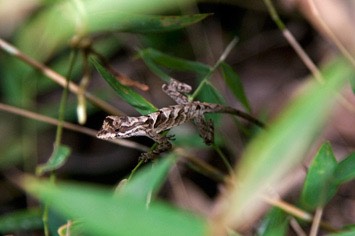
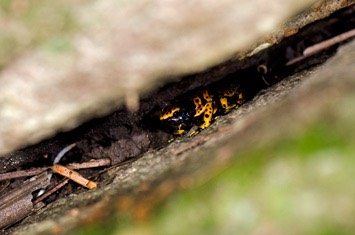
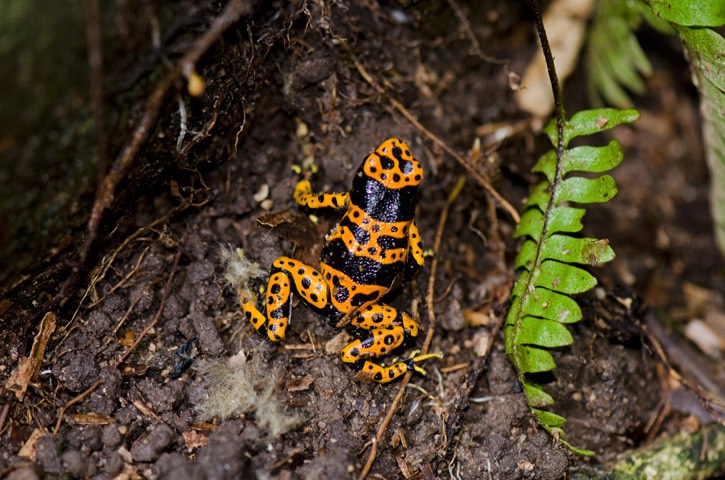
From the hill we also had a great view over Annai and the Rupununi savannah.
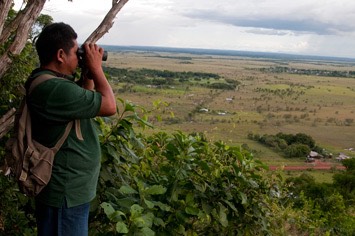
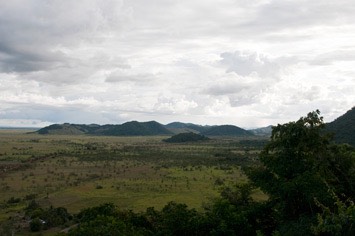
On the way back to Rock View Lodge we found several bats hanging from big rocky boulders and Hendricks informed us that they were vampire bats. We also saw a few new birds, including a magnificent savannah hawk.
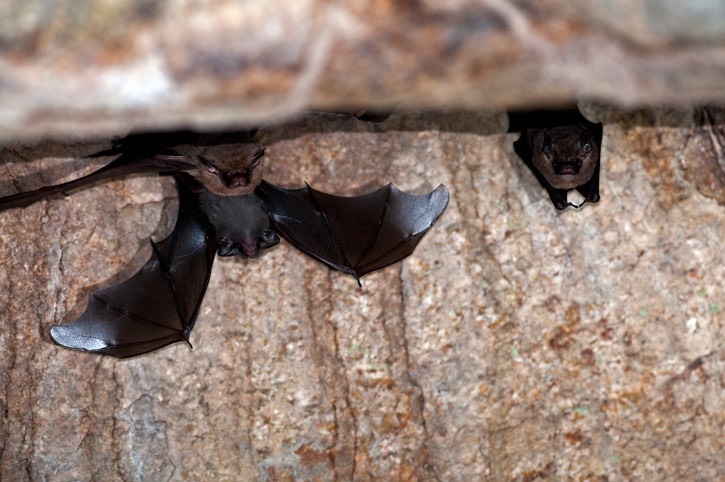
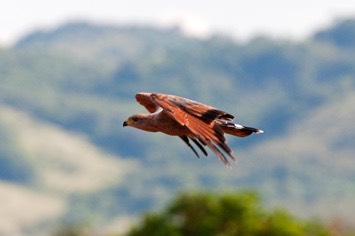
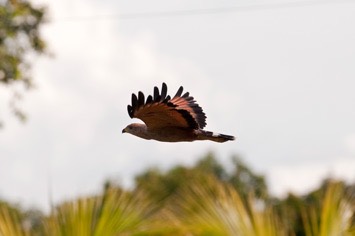
Back at the lodge we bought a few things in the little souvenir shop before having a refreshing shower. Before dinner we had aperitifs, served in the upper level of the Wood House, again with Colin Edwards presiding and dominating the conversation. Hendricks and Colin’s eldest son were also present, although his son looked rather bored and sometimes somewhat embarrassed by all the stories his father told us, which he had undoubtedly heard many times before. After the drinks we had dinner downstairs, with a choice of lovely meals from a buffet. The story telling continued until it was quite late and we all retreated to our beds.
Thursday, 05/07/2012: Rock View Lodge – Georgetown
Our flight wasn’t scheduled to leave before midmorning, so Hendricks took us and the Swiss couple for a short walk through the surroundings of Rock View Lodge. It was all a bit wet, but we managed to see a caracara perched in a tree, a couple of jabiru storks and several other colourful birds. Back at the lodge, Mick snapped a couple of photos of a hummingbird feeding from a bird feeder.
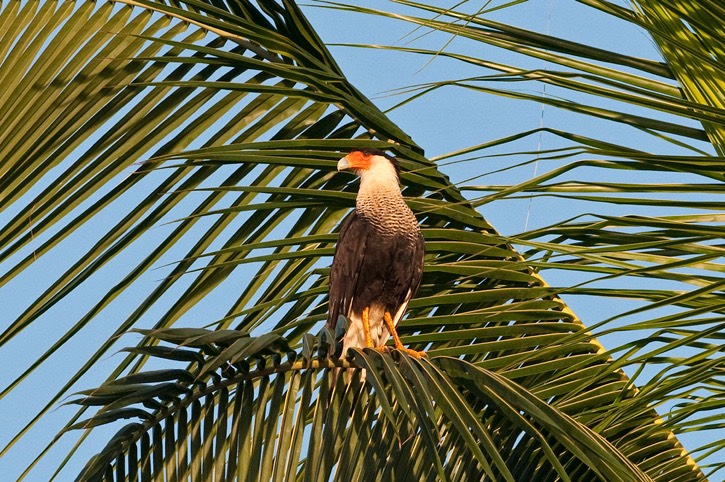
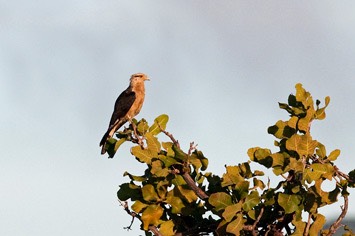
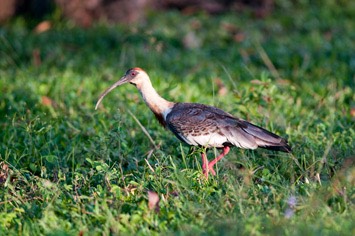
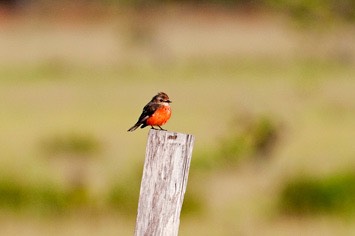
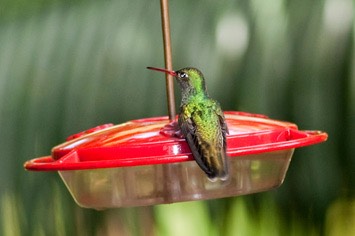
We checked our bags in and paid our usual excess charges before waiting for the plane that was supposed to arrive “at some point”. Colin took us and the Swiss couple to marvel at his fish ponds, where they raise fish for consumption by the guests.
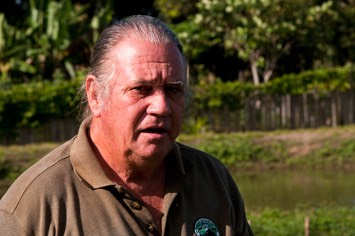
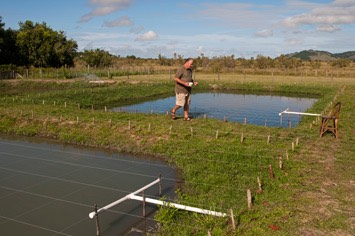
Back at the Dakota Bar, we were joined by a group of loud, unshaven young men who had turned up. They told us that they had just done a survival trip in the rainforest. We wandered around the grounds a bit more and met a very sweet little puppy.
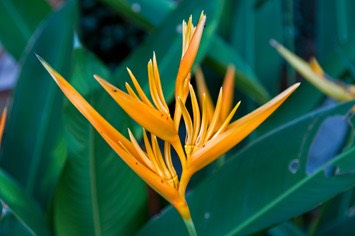
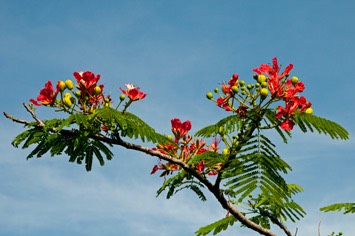
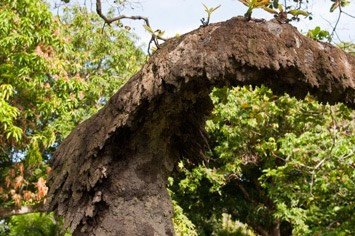
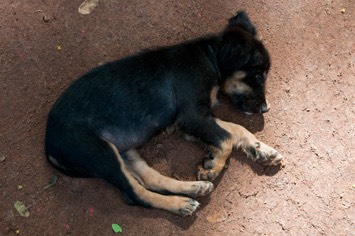
Suddenly the plane circled overhead, so we all converged on the "departure gate".
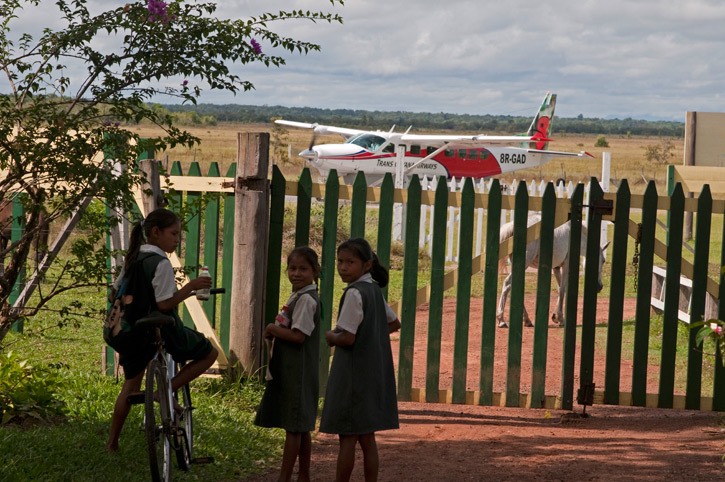
With the guys from the survival trip also travelling, the plane was pretty full, but we managed to get our favourite seats behind the pilot. We actually got an unexpected trip over southern Guyana. The plane was scheduled to go to Lethem near the Brazilian border first, before returning to Georgetown., so we flew over the flooded Rupununi savannah and got to appreciate the extent of this grassland. In some of the lakes we could even see the huge leaves of the giant water lilies Victoria amazonica.
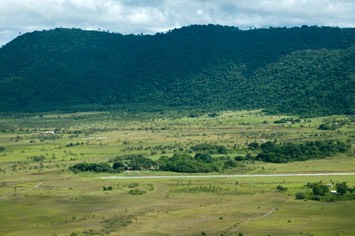
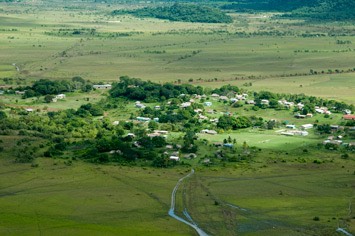
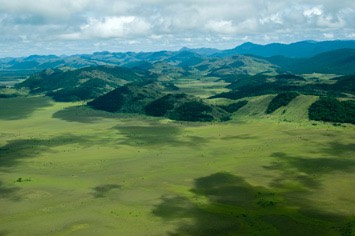
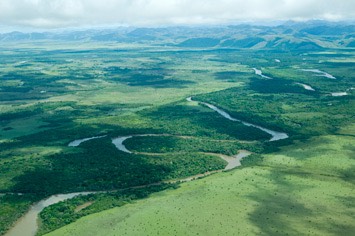
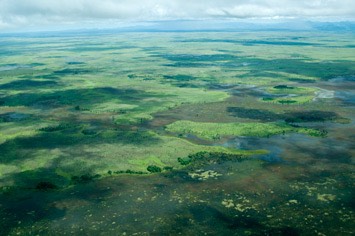
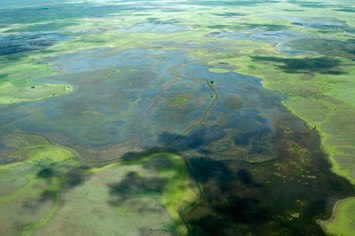
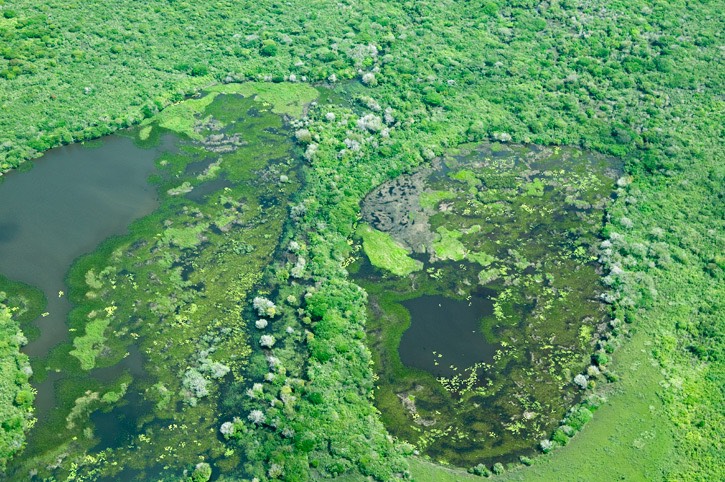
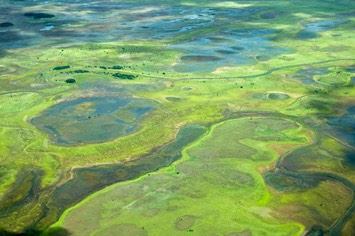
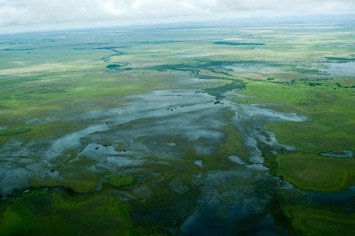
In Lethem we all had to get off the plane while it was refuelled, so we used the time for a bathroom stop and to have a look around the buildings bordering the airport.
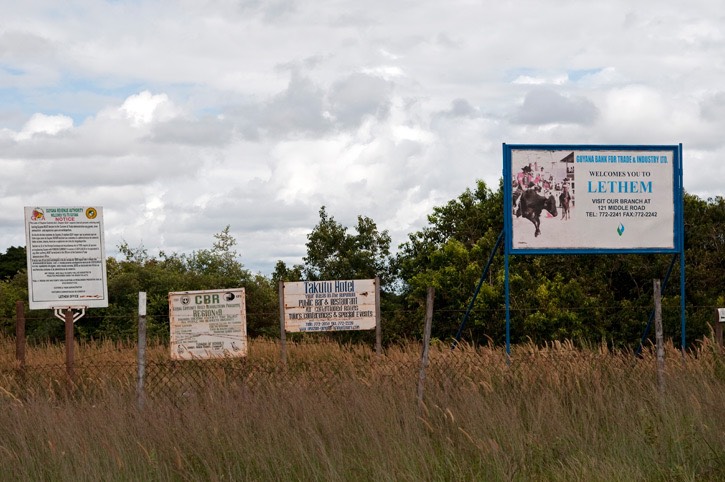
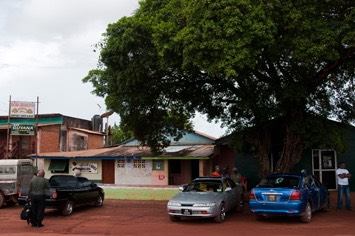
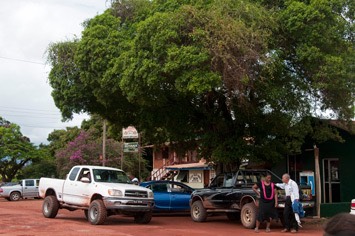
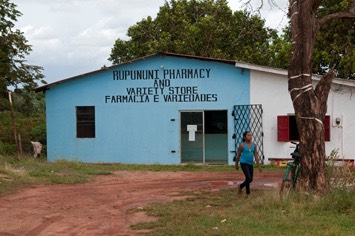
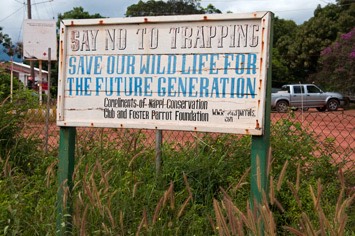
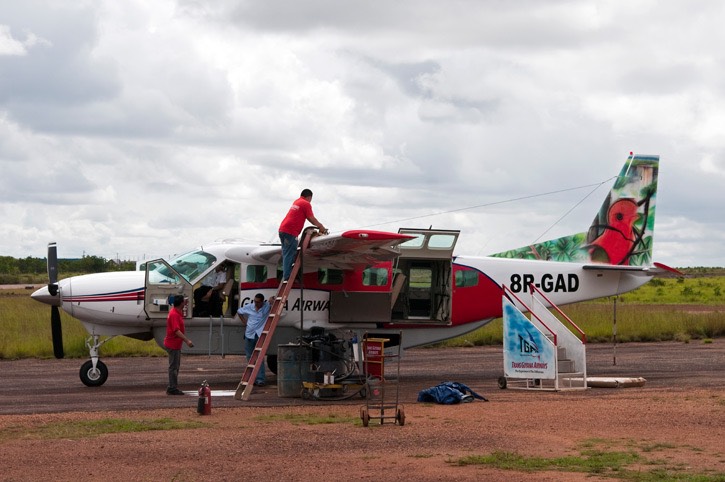
The stop didn’t take long though and we were soon airborne again, heading back to Georgetown and the coast.
